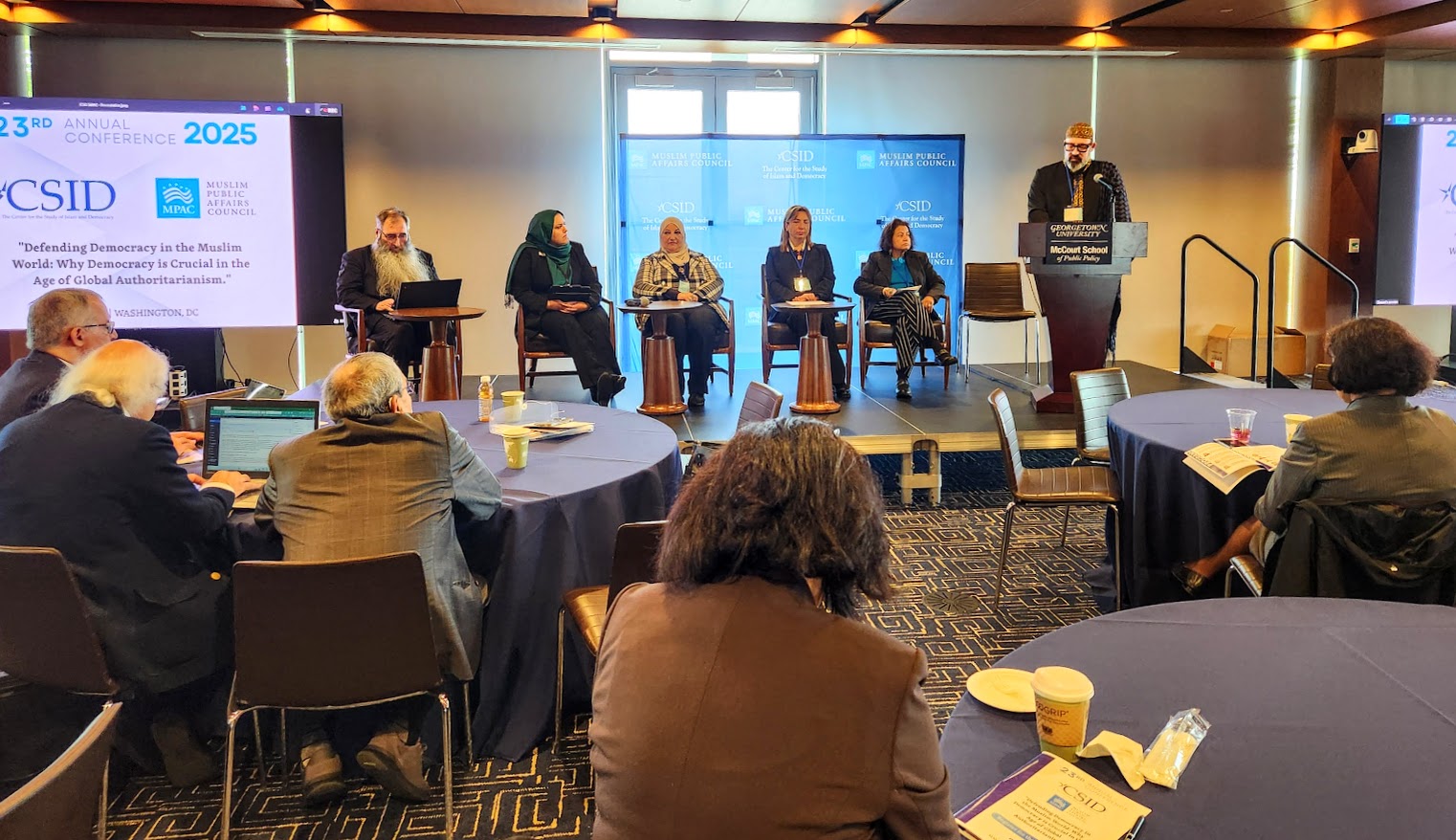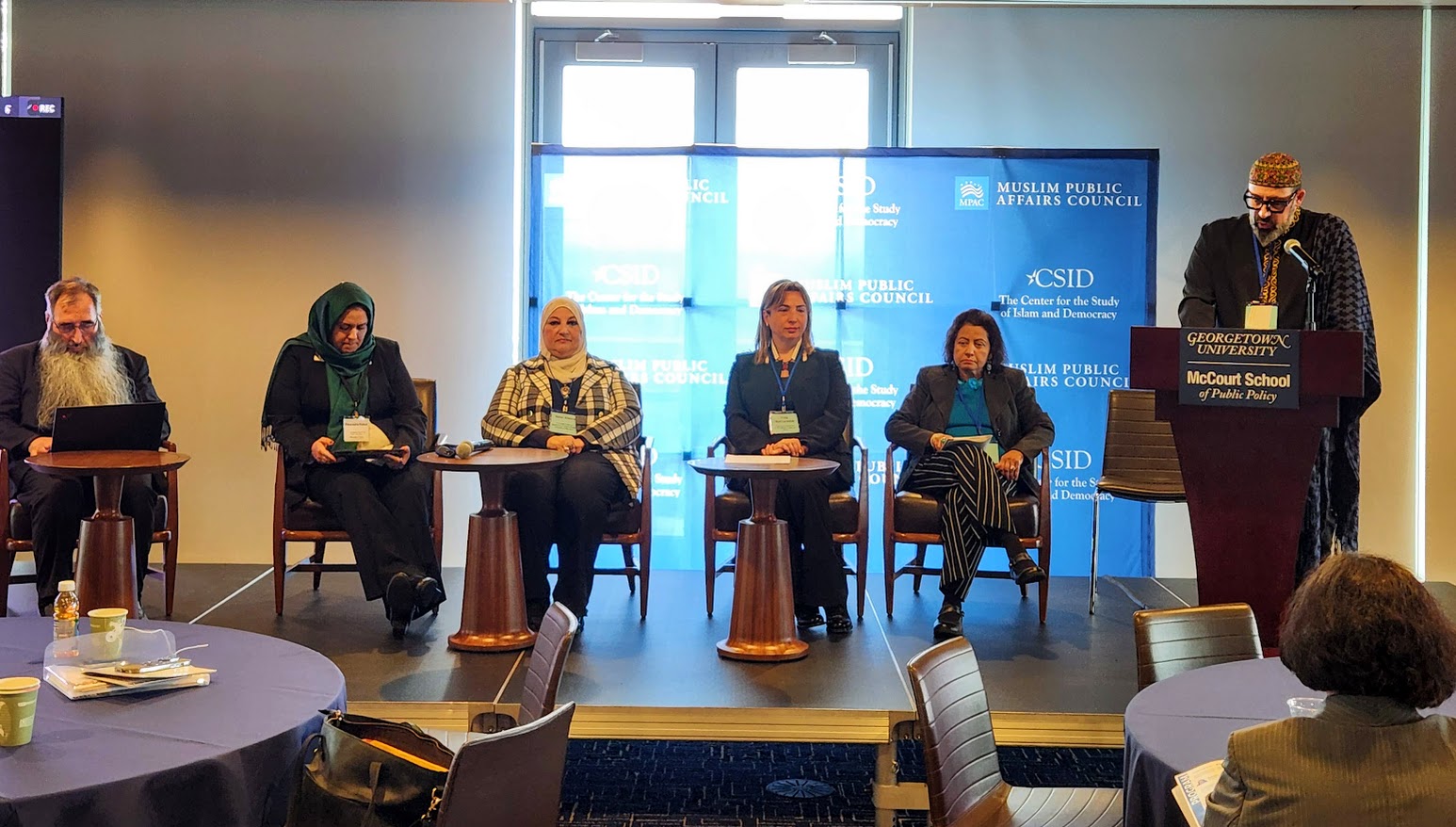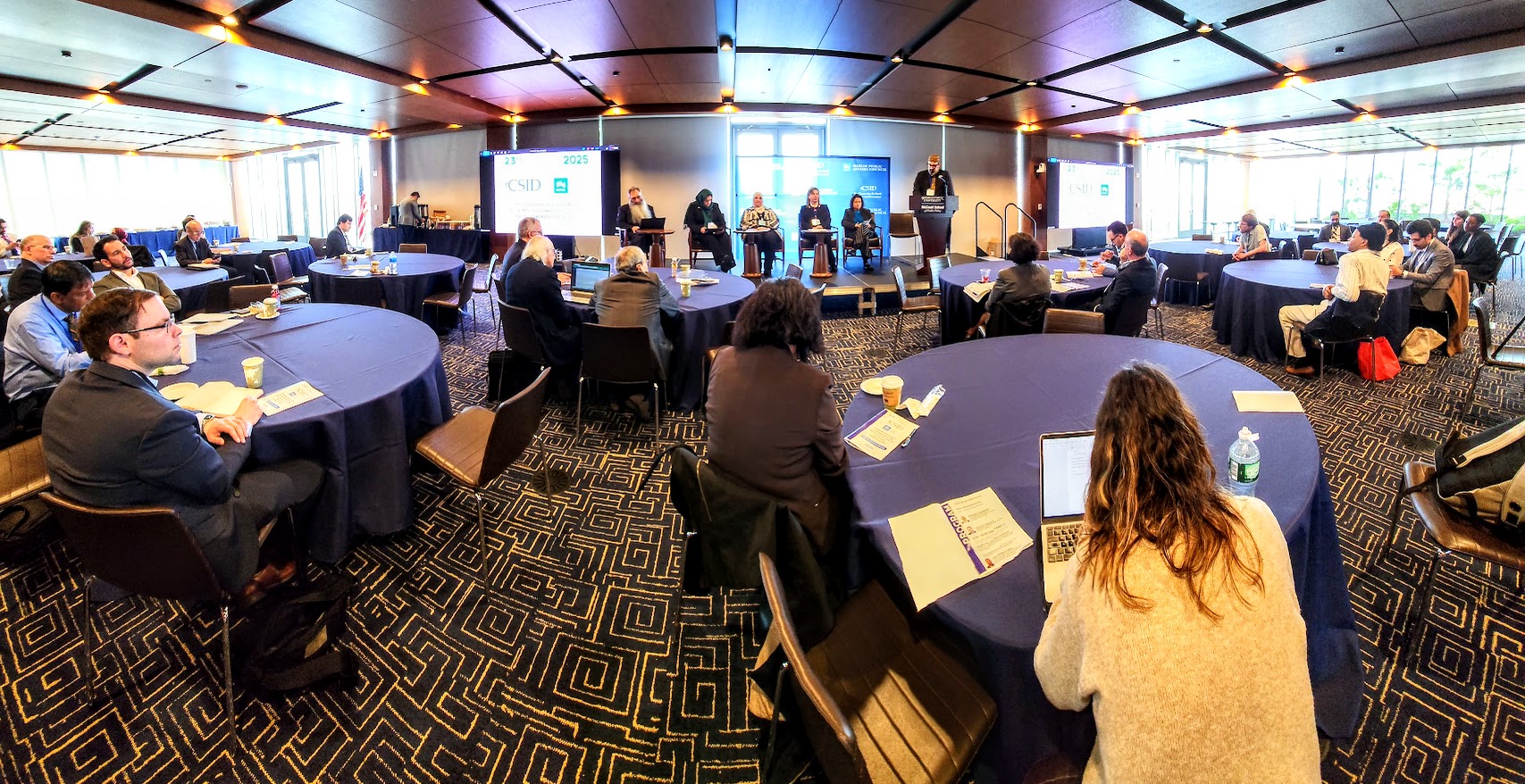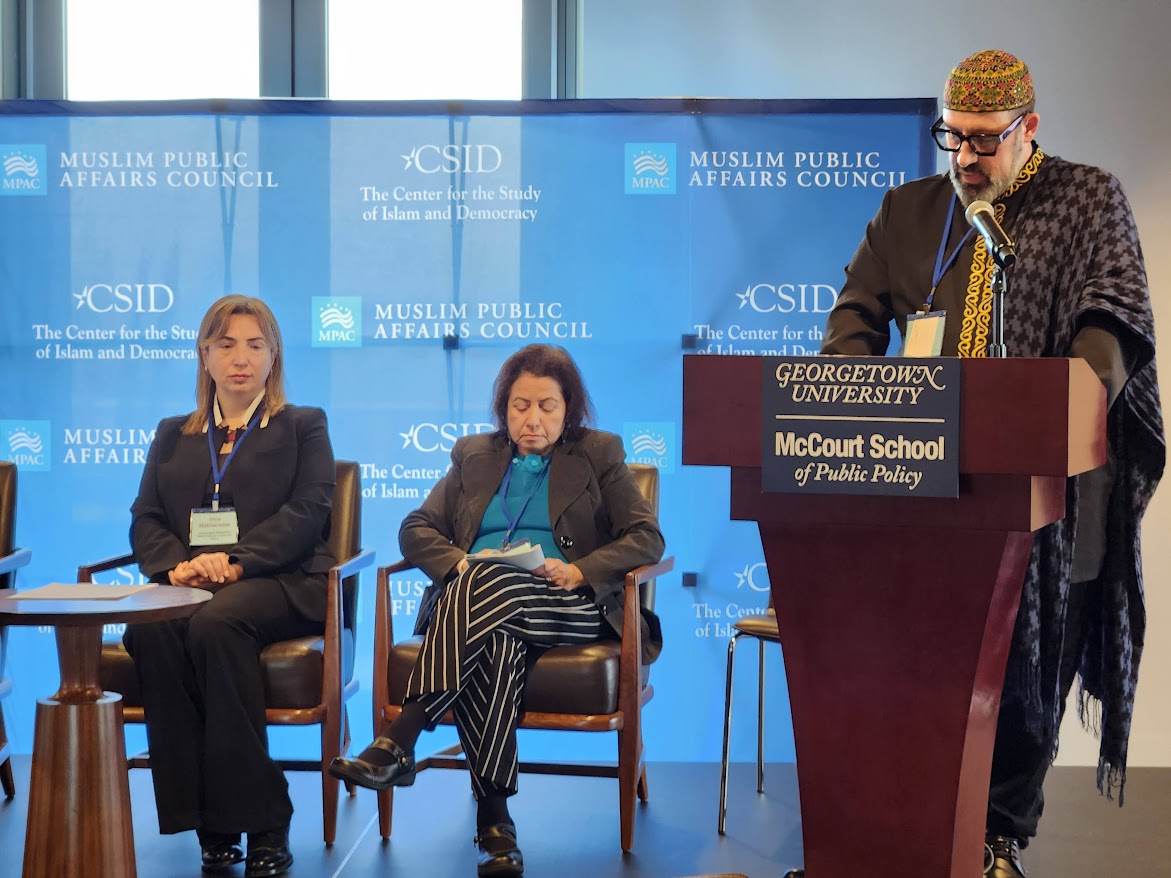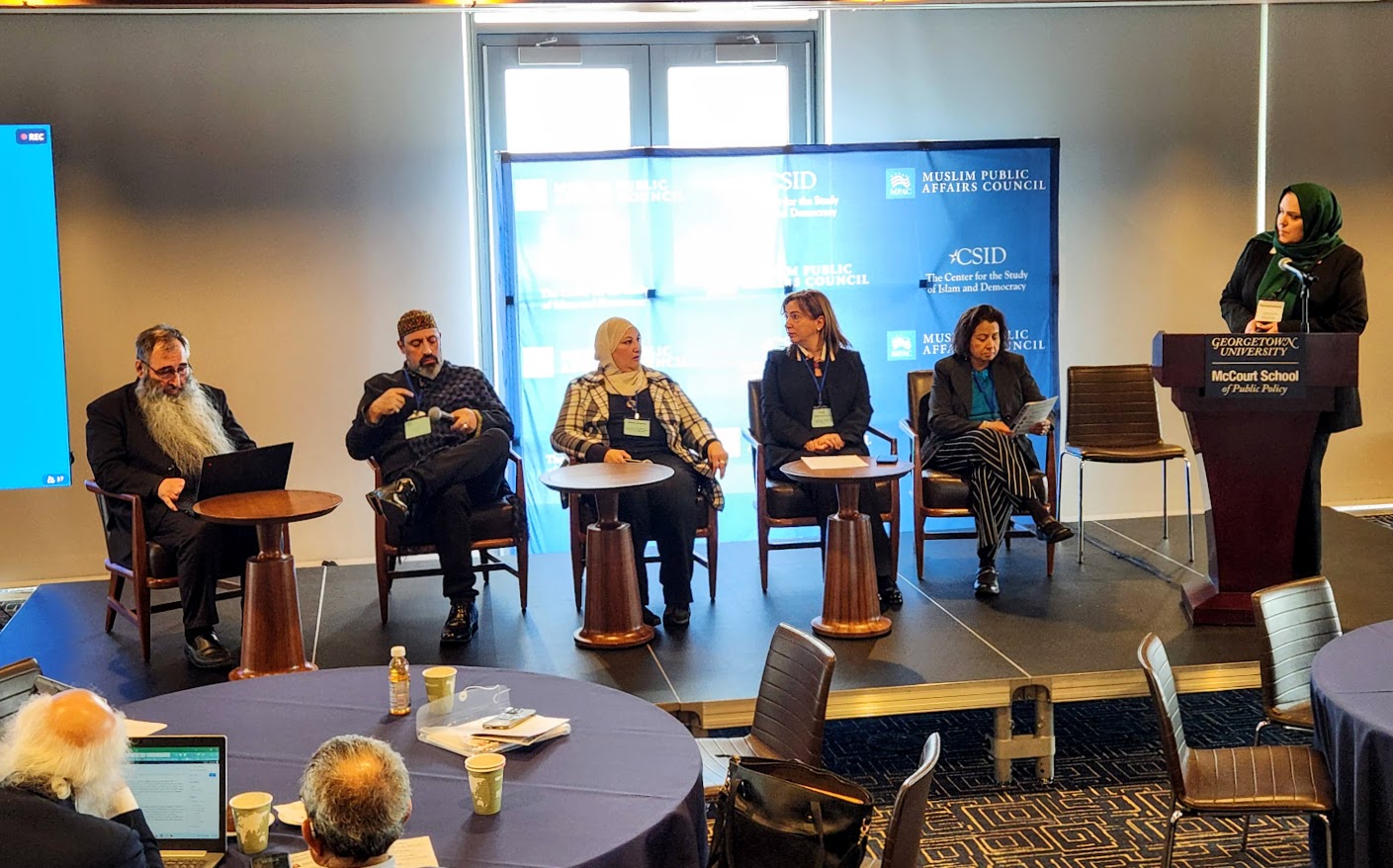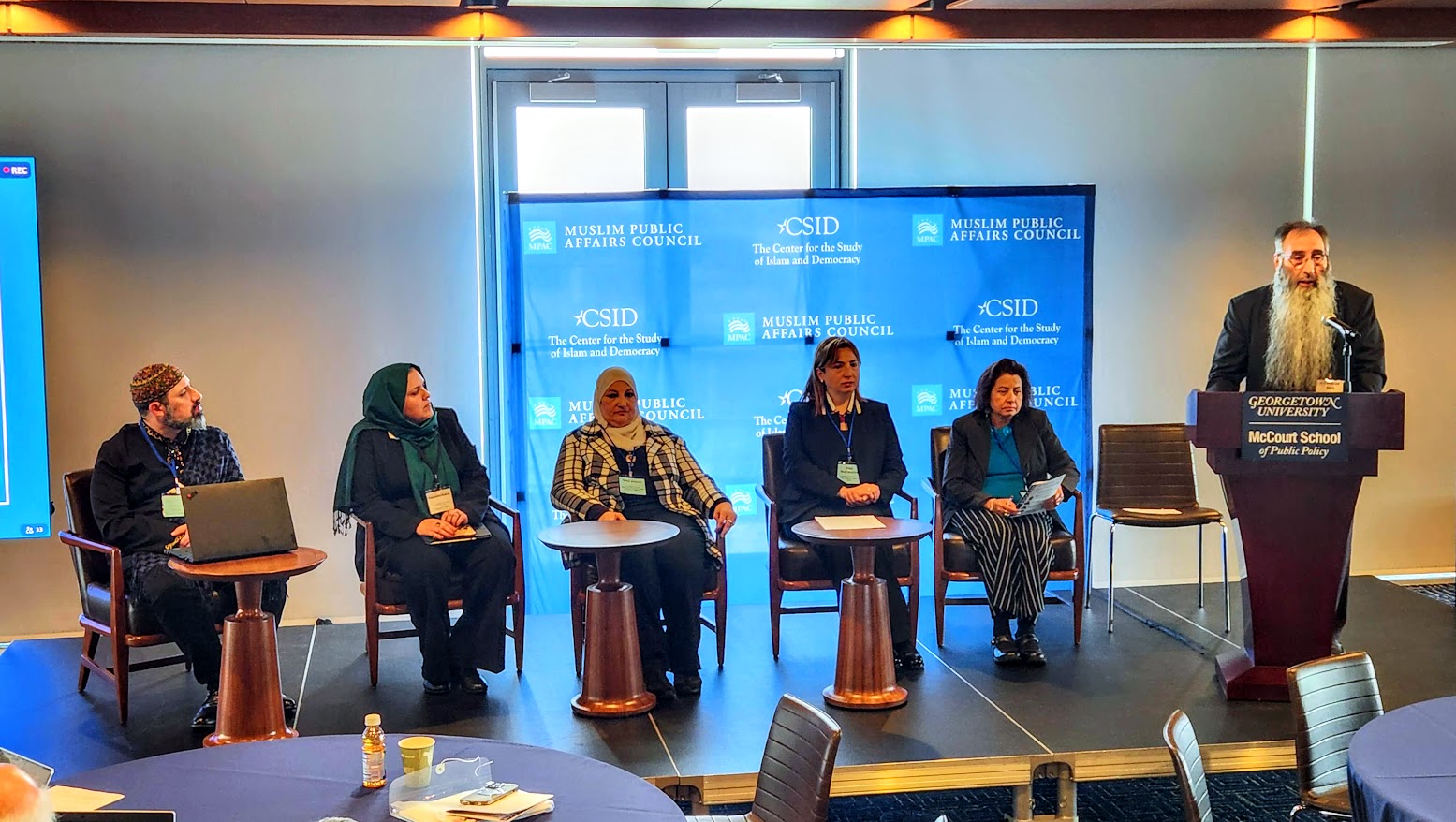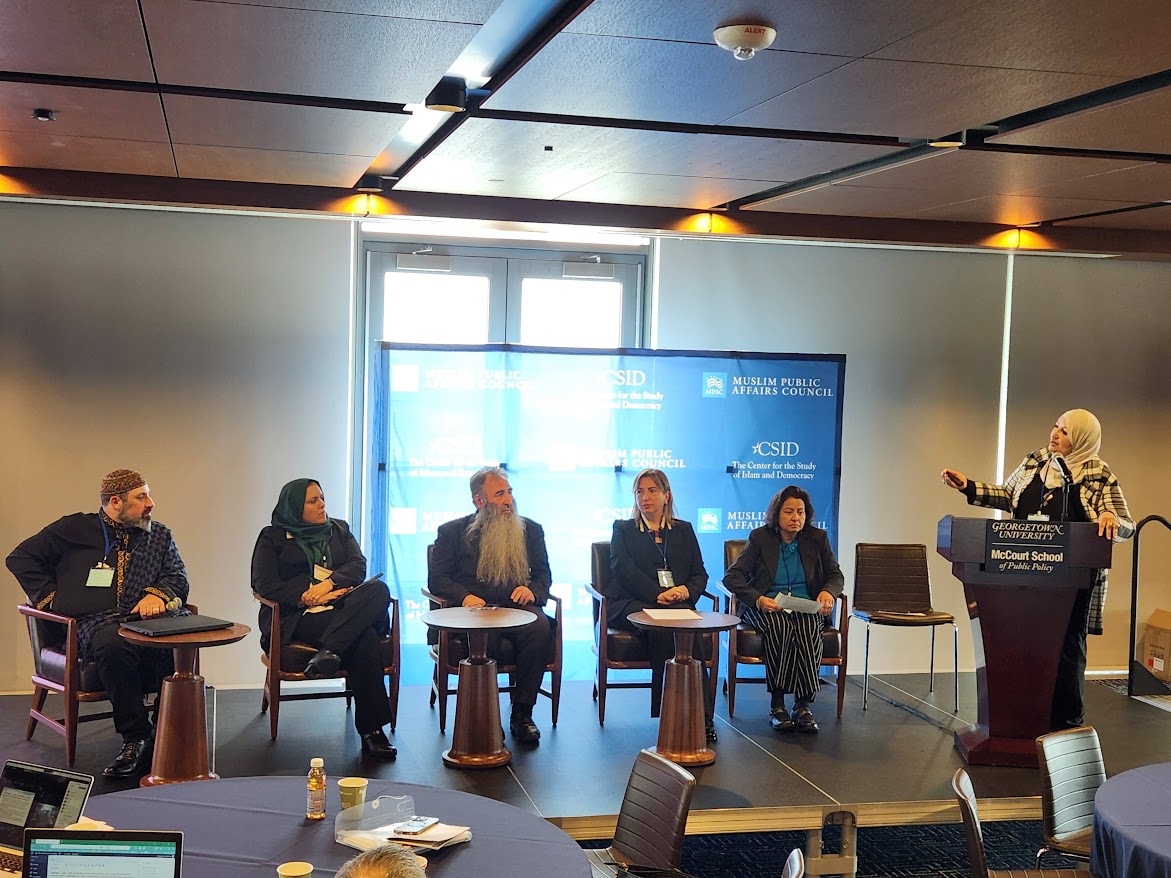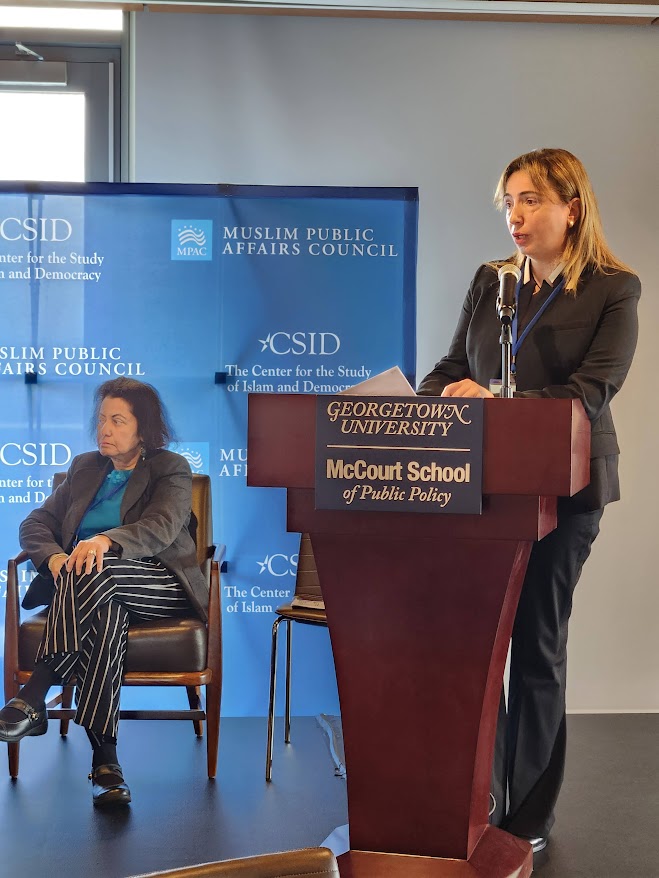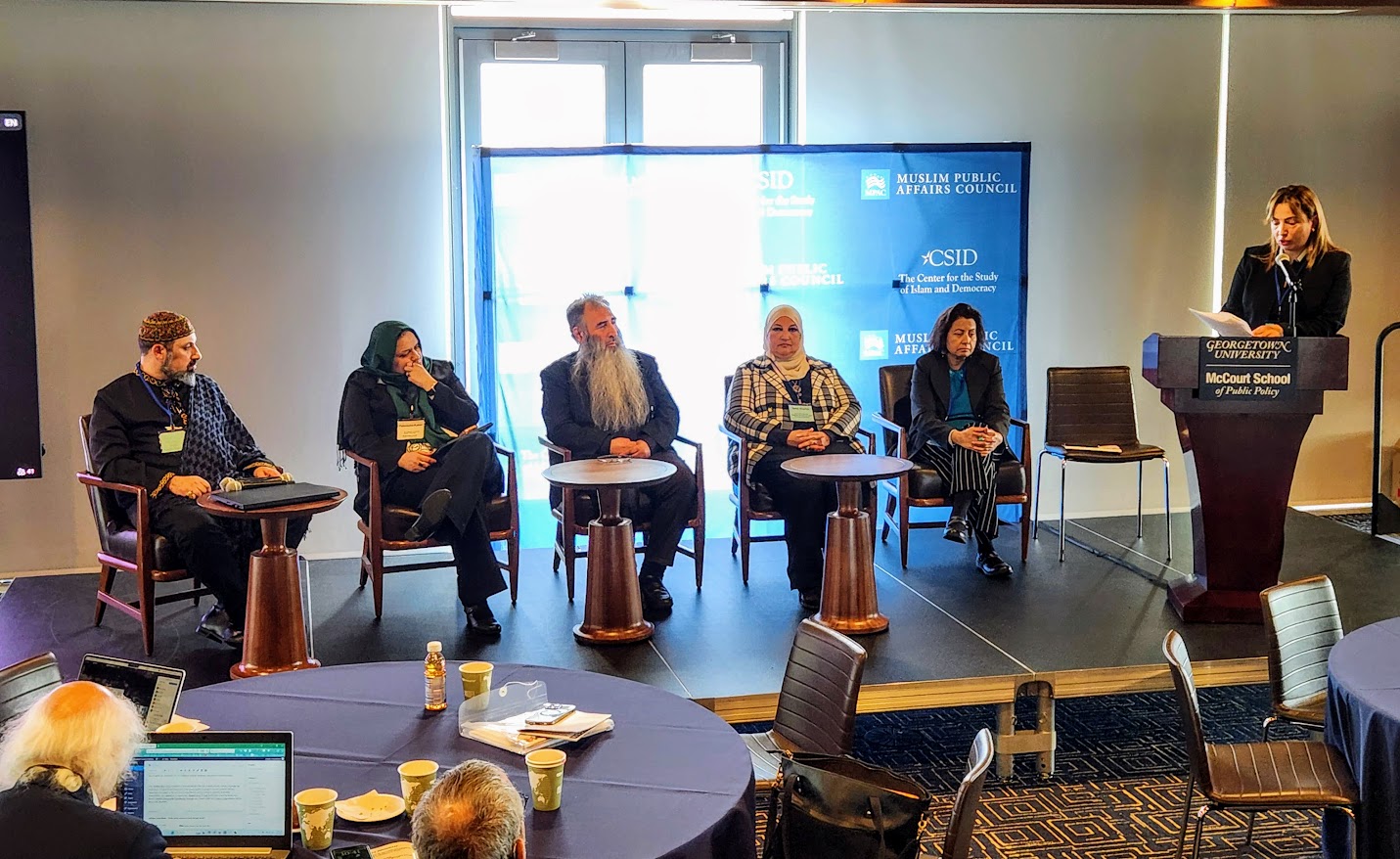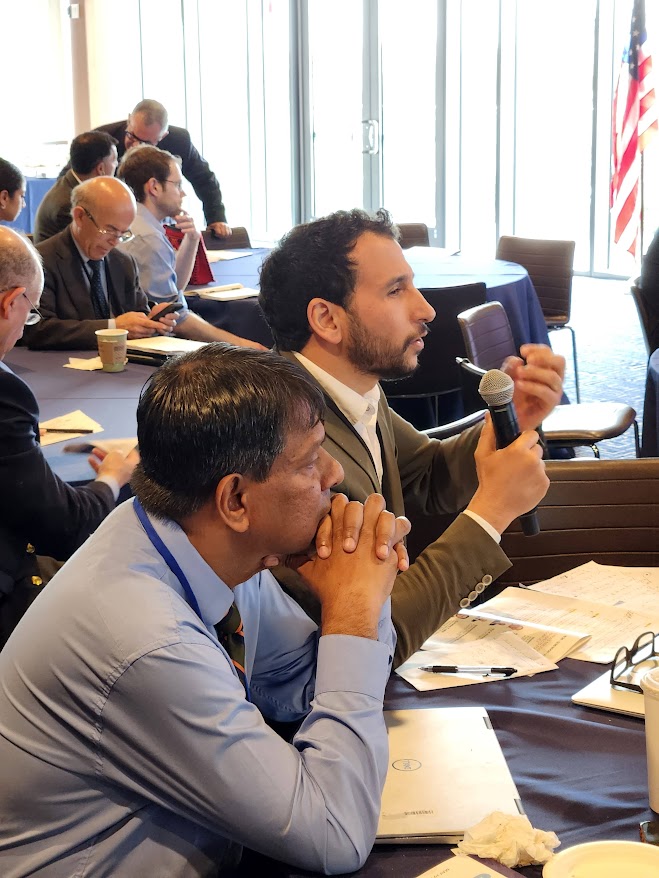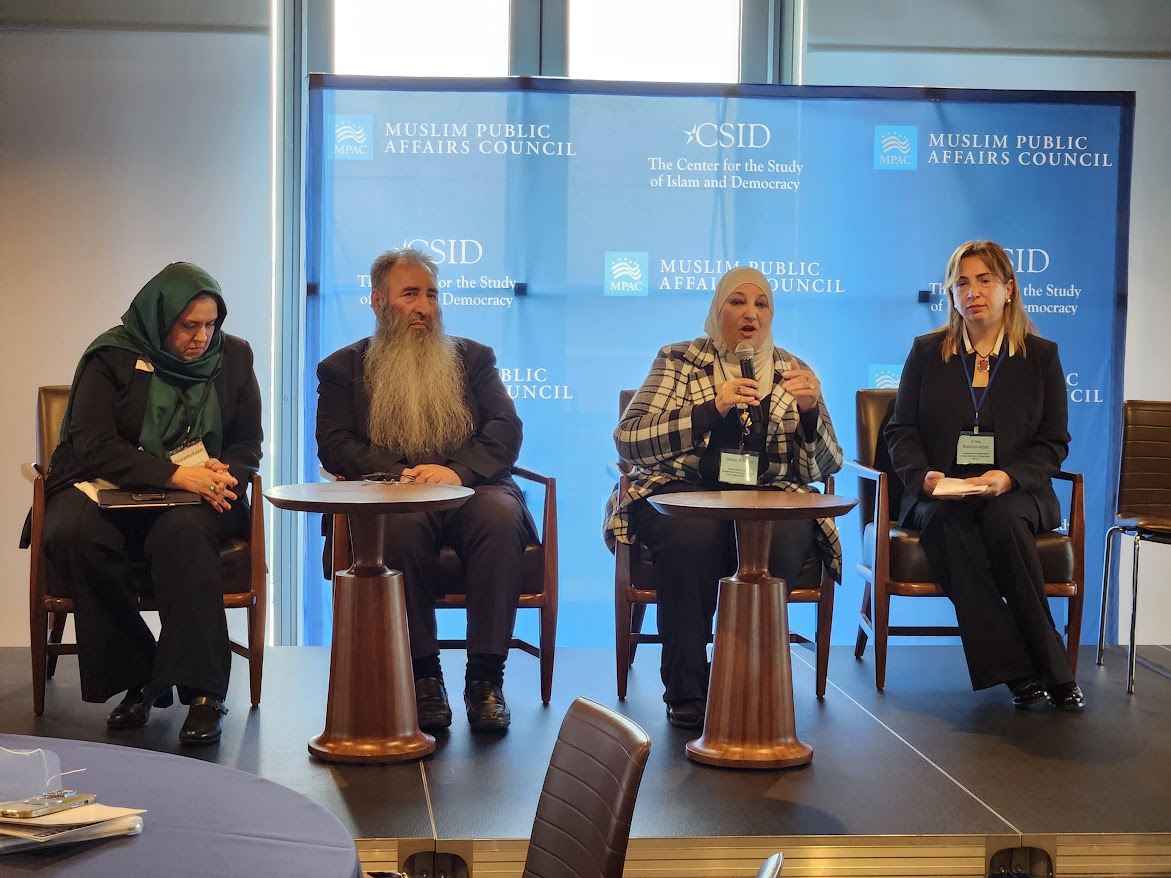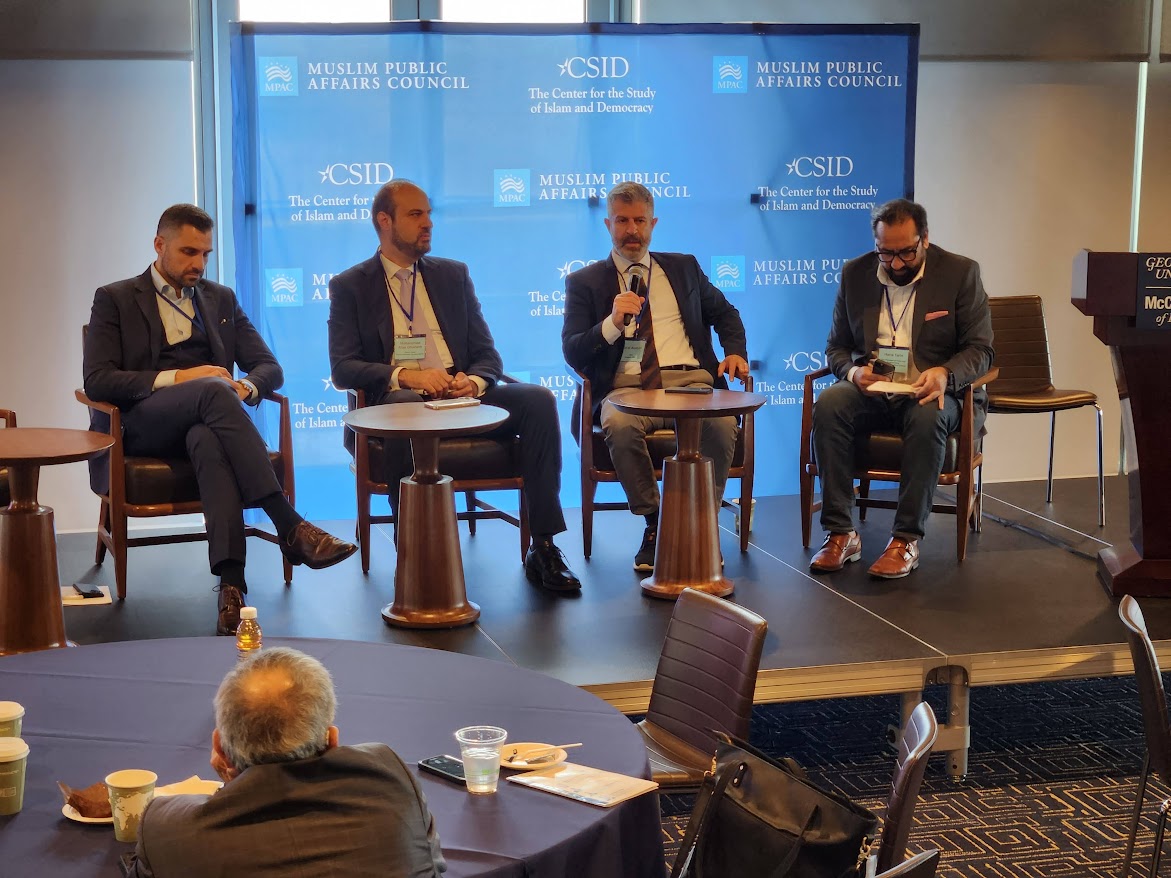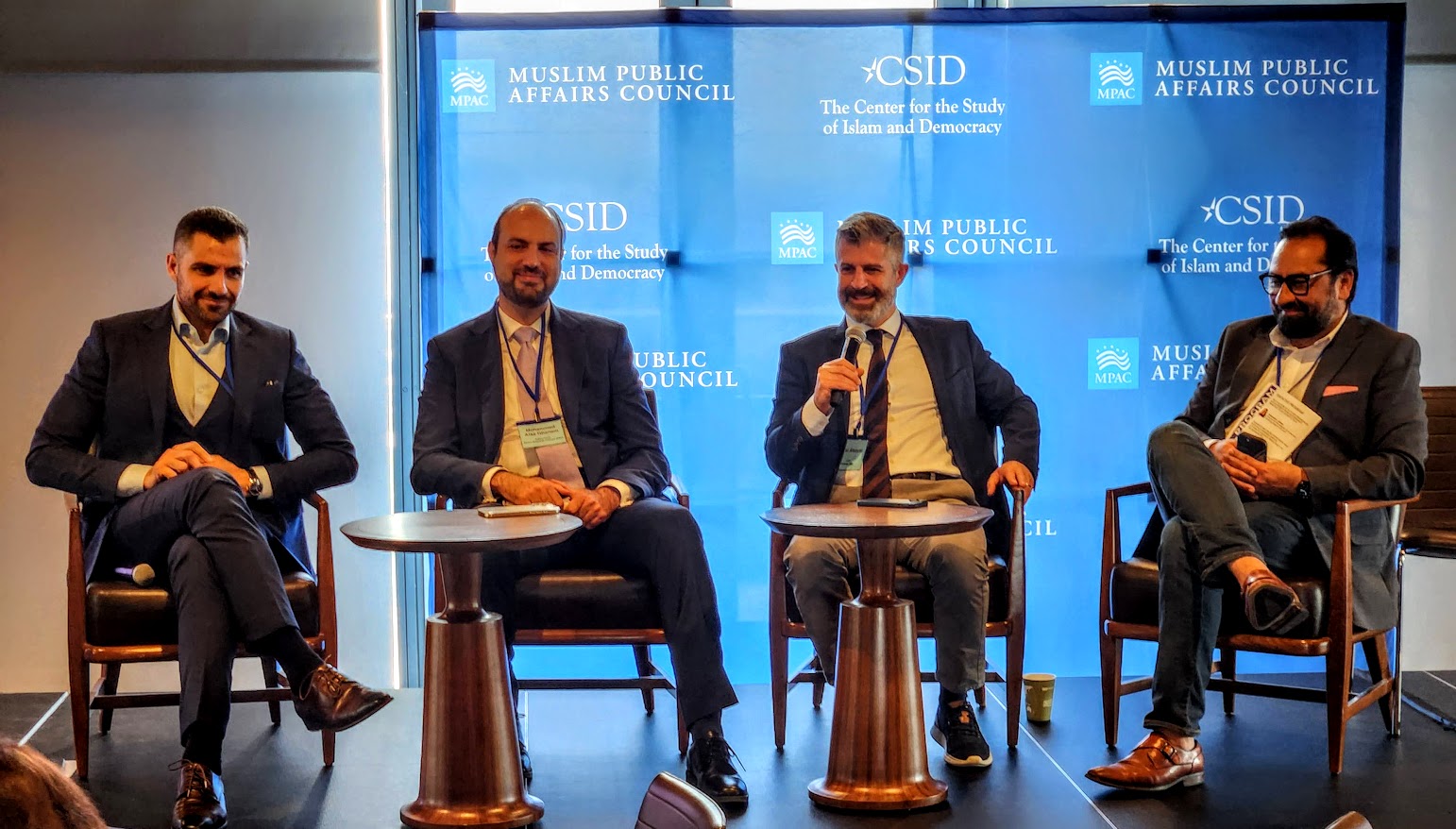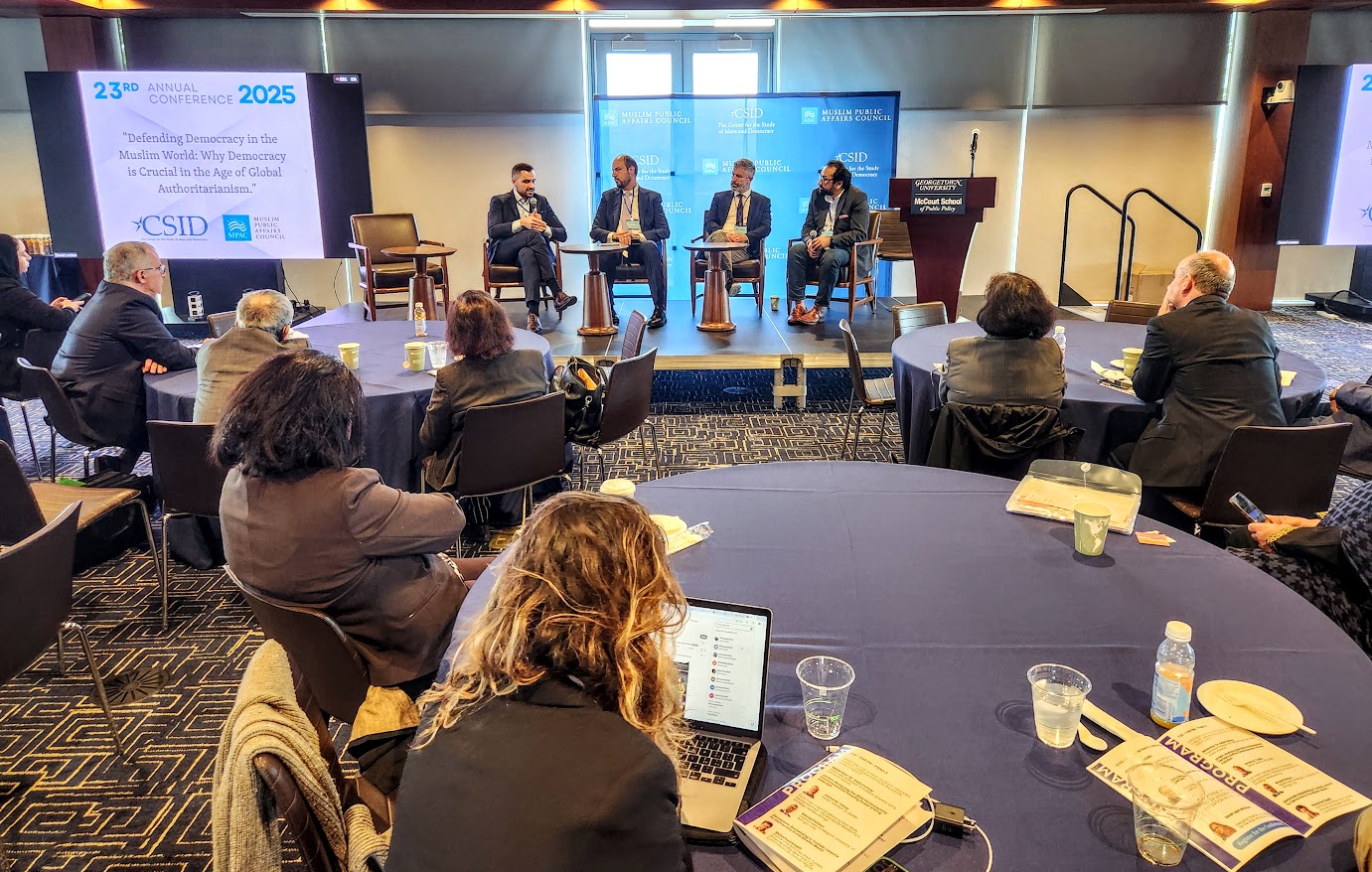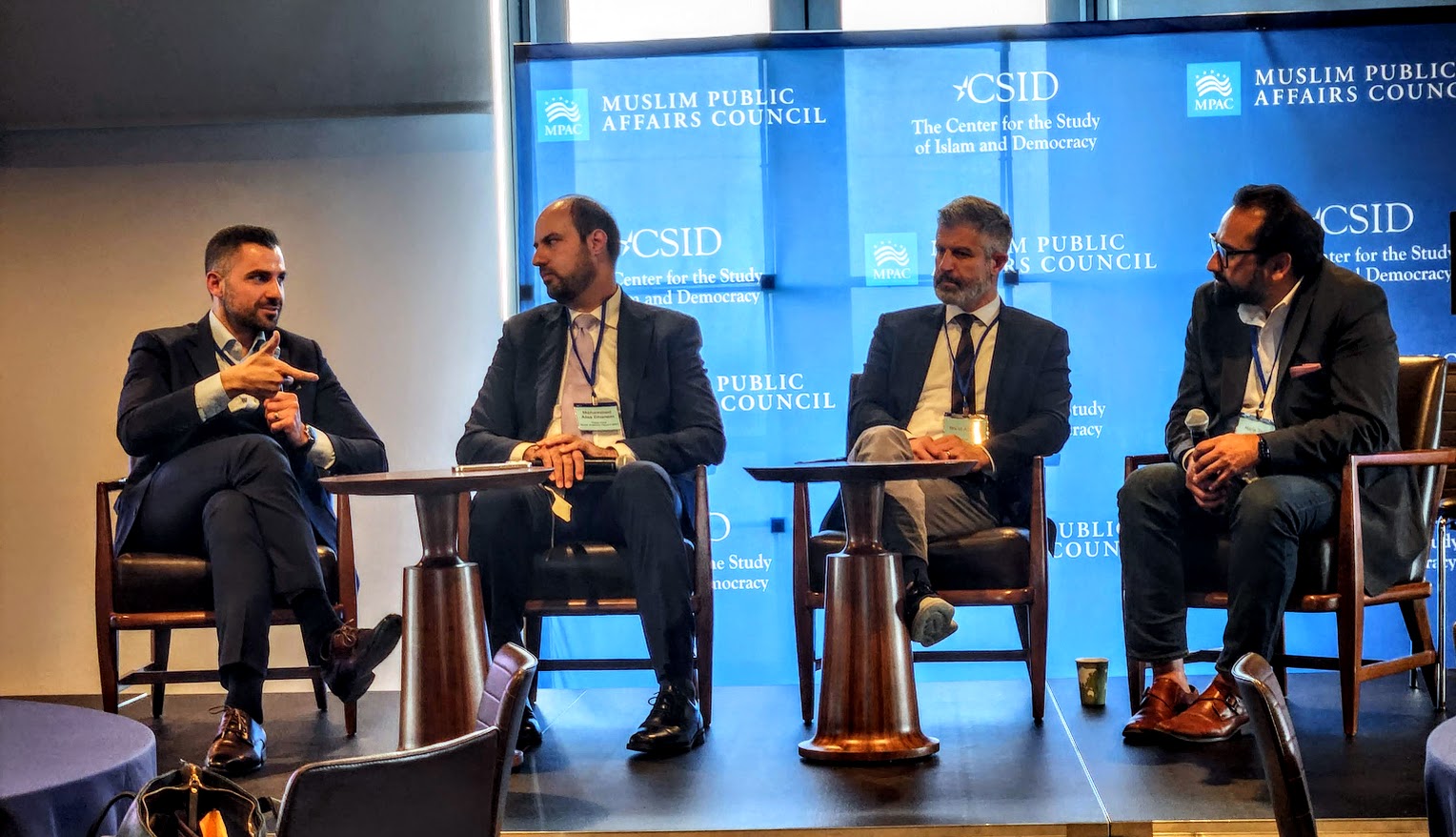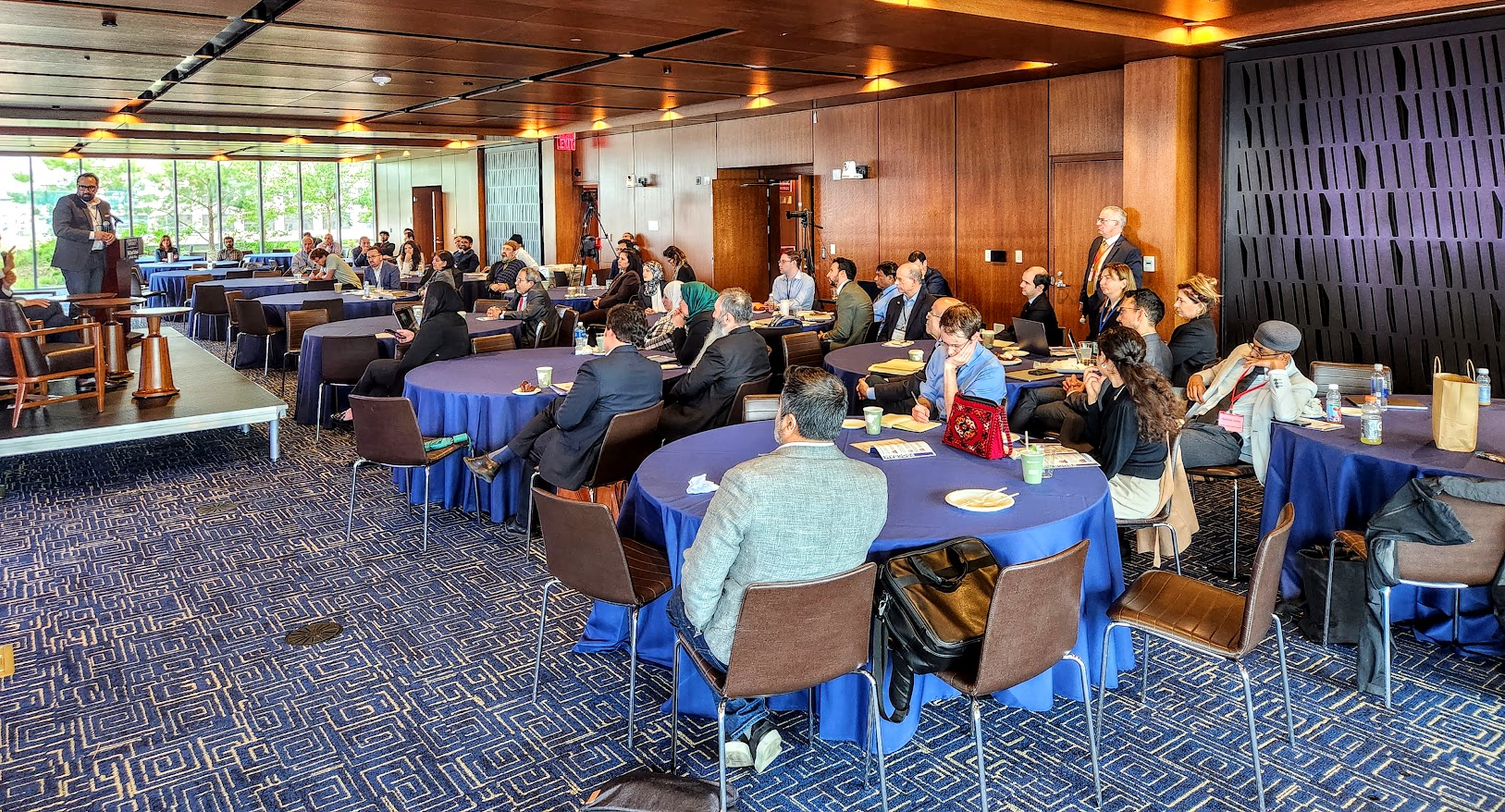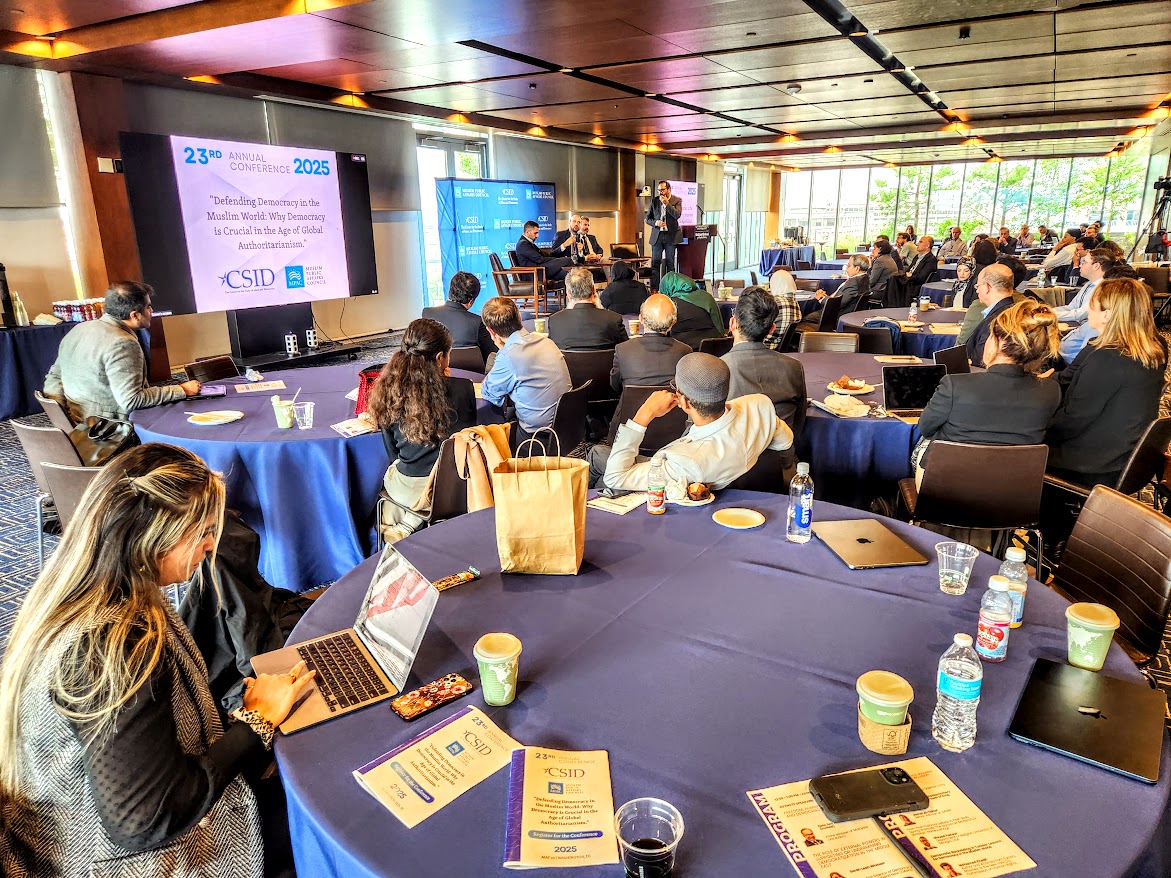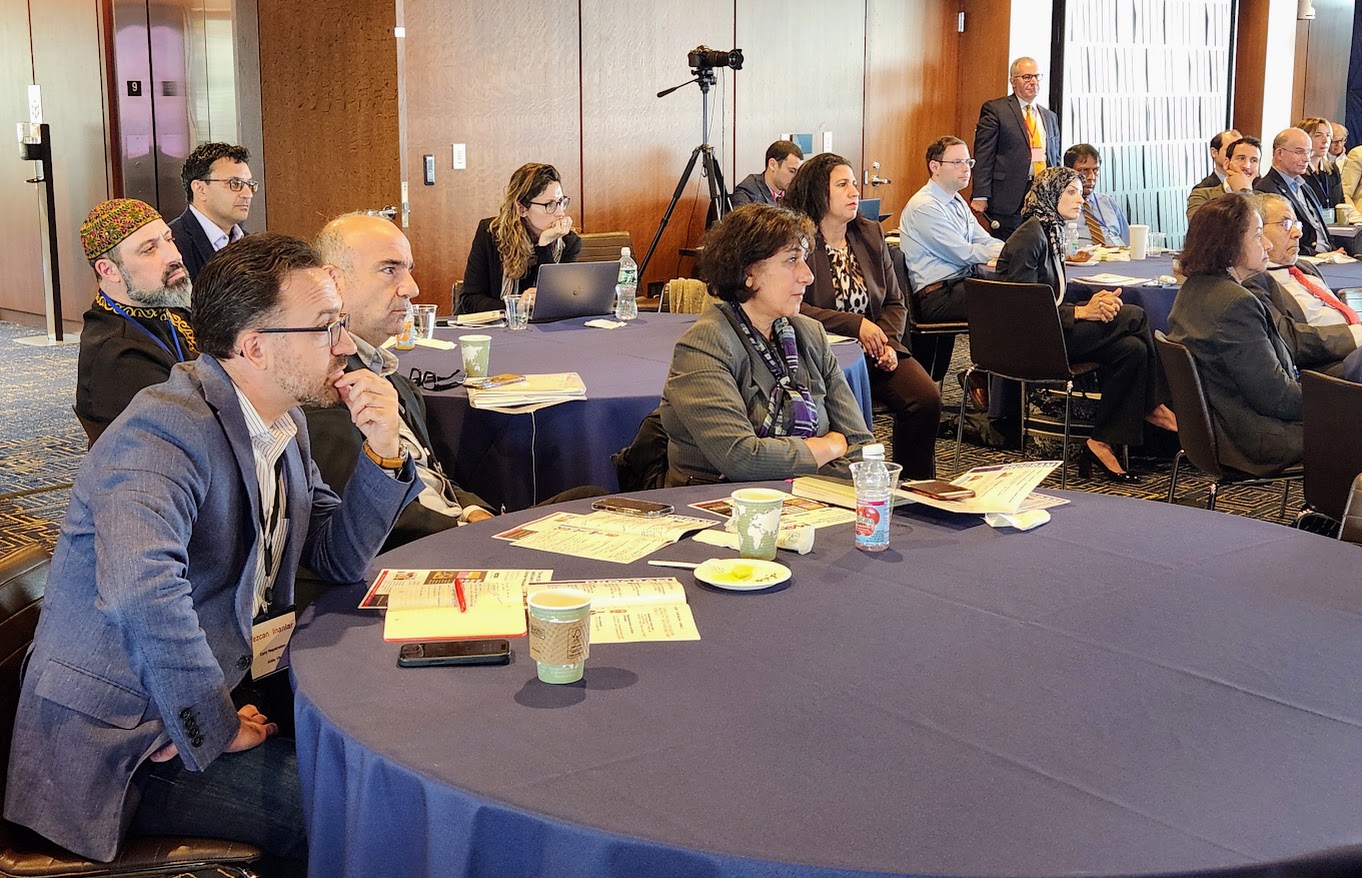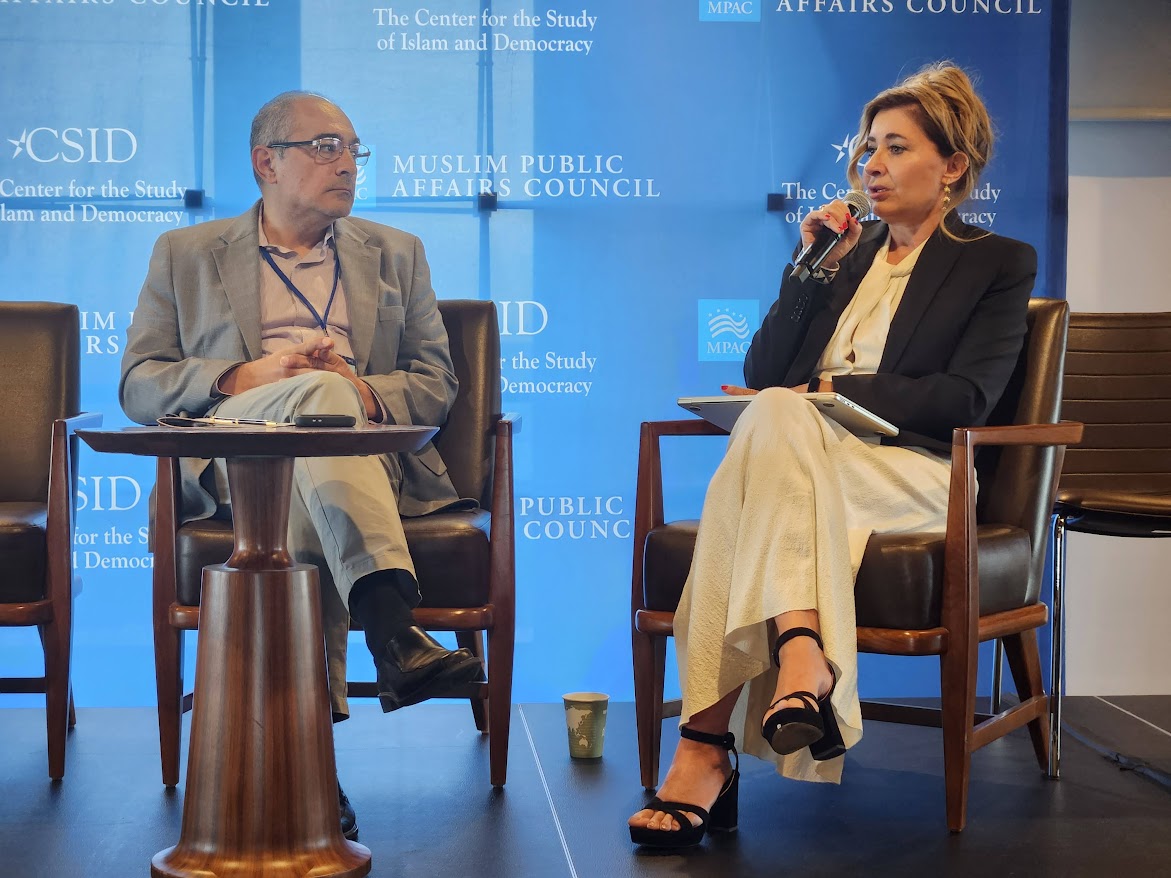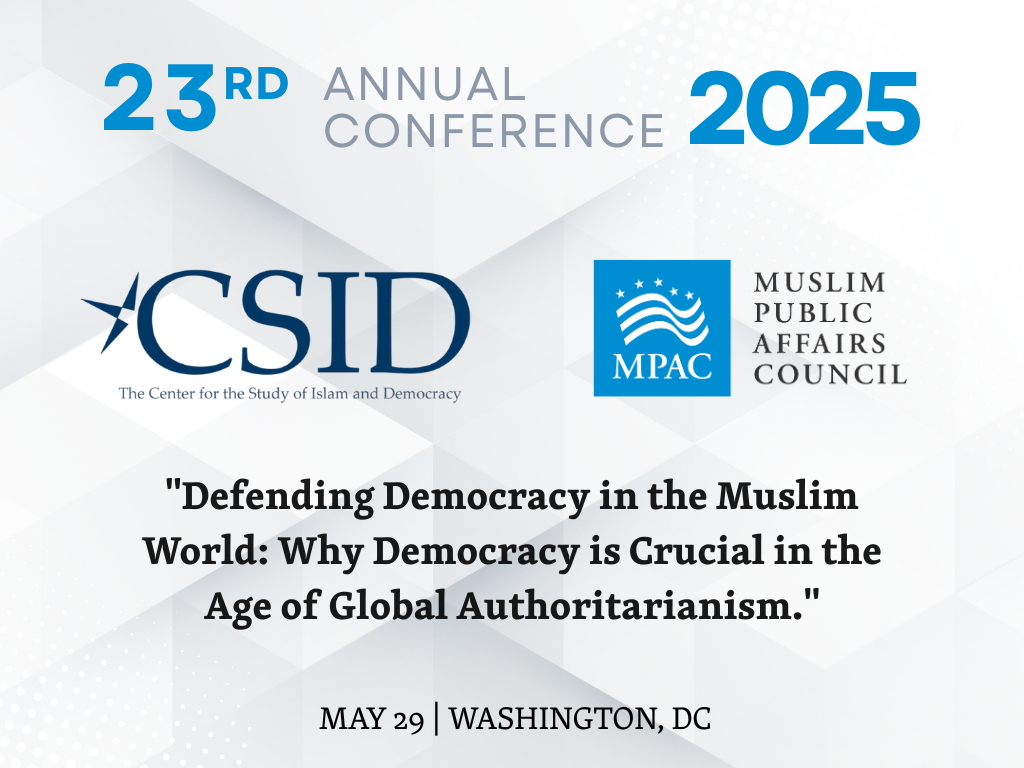CSID-MPAC 23rd Annual Conference Report
"Defending Democracy in the Muslim World: Why Democracy is Crucial in the Age of Global Authoritarianism"
May 29, 2025 | Washington, DC
The CSID-MPAC 23rd Annual Conference convened scholars, policymakers, and civil society leaders to address the urgent and growing threat of authoritarianism in the Muslim world. The conference explored how rising repression, often enabled by both domestic elites and international powers, has eroded democratic norms, weakened institutions, and silenced dissent across many Muslim-majority countries.
Participants reaffirmed that democracy is not only compatible with Islamic values but rooted in foundational concepts such as justice (adl), consultation (shura), and accountability. The decline of democratic governance was attributed to a combination of internal authoritarian entrenchment, the manipulation of religion for political ends, economic exclusion, and the weakening of civil society.
Global dynamics, especially inconsistent foreign policies from democratic powers, have further deepened the crisis. U.S. support for repressive regimes, alongside indifference toward democratic backsliding, has undermined efforts for reform and emboldened autocrats. The conference called for a reorientation of international engagement based on principled support for rights and inclusive governance.
Despite these challenges, participants emphasized the resilience of democratic aspirations within Muslim societies, especially among youth, women, and digital activists. They called for bold, unified efforts to reclaim democratic space and to resist both religious authoritarianism and geopolitical complicity.
Opening & Closing Remarks

In his welcoming remarks, Dr. Radwan Masmoudi greeted participants, scholars, policymakers, activists, and civic leaders, gathered in pursuit of justice and democratic transformation across the Muslim world. He underscored the grave crisis facing the region, as entrenched authoritarian regimes, often supported or tacitly condoned by Western powers, escalate repression, dismantle institutions, and stifle dissent.
Yet despite these dire conditions, Dr. Masmoudi affirmed that democracy and freedom are deeply rooted in Islamic tradition and represent the genuine aspirations of Muslim societies. He emphasized the urgency of recommitting to democratic principles, human rights, and the rule of law, warning that the absence of such commitments would only deepen instability and repression.
Calling for unity across religious, ideological, and geopolitical boundaries, Dr. Masmoudi advocated for broad coalitions to resist authoritarianism and build inclusive political systems. He emphasized the role of this conference in exploring how Islamic ethics can inform democratic governance, and in scrutinizing the impact of U.S. and Western policies. His remarks concluded with a message of resilience and hope, an appeal for justice, dignity, and self-determination.
Salam Al-Marayati
President, Muslim Public Affairs Council (MPAC)

Bio | Abstract | Paper | Video
Salam Al-Marayati offered an in-depth reflection on the foundational compatibility between Islam and democracy. Drawing upon the Medina Constitution, he illustrated how its principles, religious freedom, justice, consultation (shura), and the rule of law, mirror the values enshrined in the U.S. Constitution. He criticized modern Islamic governments and political movements for betraying these values, despite invoking Islamic legitimacy.
Al-Marayati also warned of parallel trends in the West, where rising oligarchic control mirrors the decline of democratic principles in Islamic history under dynastic and tribal rule. He urged a revival of democratic commitment rooted not only in religious tradition but in national identity and civic engagement. His remarks concluded with a call to reclaim the democratic spirit of Medina to counter both regional authoritarianism and global democratic erosion.
Panel 1: Islam and Democracy: Why Religion and Religious Values Matter?
Moderated by Prof. Asma Afsaruddin, Professor of Middle Eastern Languages and Cultures, Indiana University & Chair of the CSID Board of Directors

The Amman Message and Participatory Governance in the Muslim World
John Thomas Pinna, Founder and Executive Director, Muslims for Muslims International

Bio | Abstract | Paper | Video
John Thomas Pinna explored the consonance between Islamic principles and democratic governance. He emphasized foundational Qur’anic values, shura (consultation), adl (justice), and accountability, as essential to any legitimate political system in Muslim-majority contexts. Citing classical scholars such as Al-Mawardi, Al-Ghazali, and Ibn Taymiyyah, Pinna underscored the Islamic scholarly tradition's insistence on just leadership and moral responsibility.
He further highlighted contemporary Islamic scholarship asserting that democracy is not only compatible with Islamic governance but essential to its ethical realization. Pinna's remarks reinforced the idea that Islamic political thought can and should serve as a framework for participatory governance in Muslim societies.
The Evolution of Authoritarianism in the Muslim World: From Governance Principles to Autocratic Rule
Palwasha L. Kakar, Director, Religion and Peacebuilding Program, United States Institute of Peace (USIP)

Bio | Abstract | Paper | Video
Palwasha L. Kakar addressed the decline of participatory governance across Muslim-majority states. She argued that authoritarian regimes have systematically eroded rights, dismantled institutions, and suppressed civic engagement, often with the implicit or explicit support of Western powers.
Kakar pointed to the co-optation of religion, particularly the role of “scholars of the sultan,” who legitimize autocratic rule while betraying Islam’s ethical commitments to justice and accountability. She traced this political regression as a departure from classical Islamic governance models, raising urgent concerns about the role of religious authority and foreign influence in perpetuating authoritarianism.
Transnational Online Repression and Resistance: Gendered Digital Activism to Advance Democracy in the Muslim World
Dr. Sahar Khamis, Associate Professor, Department of Communication, University of Maryland

Bio | Abstract | Paper | Video
Dr. Khamis examined the digital realm as both a space of repression and a vital tool of resistance, particularly for women activists. Highlighting the Arab Spring uprisings, she illustrated how women leveraged social media to organize protests, challenge regimes, and amplify calls for justice.
In the aftermath, however, she observed an escalation in digital repression, doxing, harassment, and coordinated smear campaigns, all aimed at silencing female dissent. Despite these challenges, Khamis emphasized that women in the Muslim world continue to utilize digital platforms for advocacy, awareness-raising, and documentation of human rights violations. Her remarks illuminated both the vulnerability and resilience of women’s digital activism in authoritarian contexts.
Defending Democracy in the Muslim World: A Path to Justice, Stability, and Prosperity
Dr. Irma Makharadze, Independent Researcher, Tbilisi Institute of Asia and Africa, Georgia

Bio | Abstract | Paper | Video
Dr. Makharadze analyzed how Islamic ethical principles can serve as a moral and structural basis for democratic governance. She highlighted the Qur’anic imperatives of shura, adl, and public accountability as deeply compatible with modern democratic norms.
However, she noted a stark dissonance between these ideals and political realities in many Muslim-majority states, where authoritarianism remains entrenched. Dr. Makharadze advocated for the integration of Islamic ethical frameworks into contemporary governance models as a means to promote dignity, inclusion, and long-term political stability. Her analysis called for a principled return to Islam’s foundational values to resist autocracy and enable democratic flourishing.
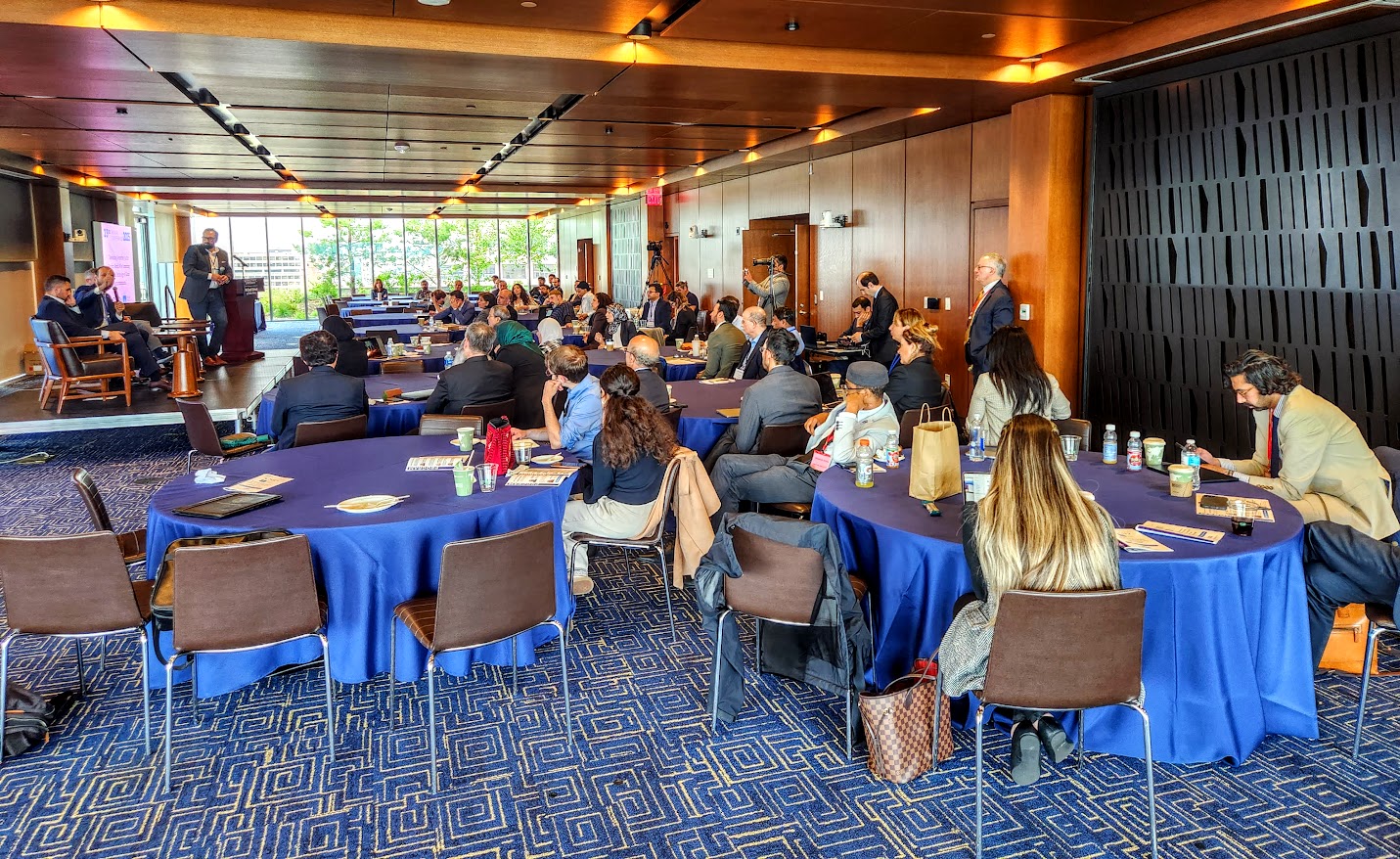
Panel 2: Syria’s Struggle for Freedom: Prospects for Democracy Amid Conflict
Moderated by Haris Tarin, Vice President of Policy and Programming, Muslim Public Affairs Council (MPAC)

Wa’el Alzayat
Chief Executive Officer, Emgage USA

Bio | Abstract | Paper | Video
Wa’el Alzayat delivered a compelling reflection on the Syrian people’s enduring pursuit of dignity and democratic reform, framing Syria as a bellwether for the broader MENA region. He emphasized that, after years of systematic repression by the Assad regime, recent political shifts signal a potential turning point, one that demands renewed international engagement centered on justice, accountability, and inclusion.
Alzayat criticized the global response to the Syrian conflict as inconsistent and insufficient, particularly in failing to support civil society and pursue meaningful transitional justice. He stressed that a sustainable future must prioritize Syrian voices, those who have suffered most and continue to advocate for change from within and in exile.
Drawing parallels with democratic norms that have enabled Arab and Muslim communities to thrive in the U.S., Alzayat underscored the need for similar principles, rule of law, pluralism, and rights-based governance, to take root in Syria. His remarks called for a people-centered approach to rebuilding Syria, grounded in solidarity, not geopolitical expediency.
Mohammed Alaa Ghanem
Policy Chief, Syrian American Council (SAC)

Bio | Abstract | Paper | Video
Mohammed Alaa Ghanem offered a personal and poignant account of Syria’s transformation, describing the fall of Assad’s control over Damascus as a moment of profound emotional and historic release. For many Syrians, it marked the end of a suffocating era defined by authoritarian rule and the cult of the Assad regime. Yet, the initial euphoria has been tempered by the harsh realities of economic collapse, institutional breakdown, and widespread humanitarian need.
Ghanem painted a picture of a country rising from the ashes, scarred by years of violence and state decay, but showing signs of new direction. He noted emerging efforts by Syria’s new leadership to stabilize the economy through energy agreements and inflation control, reflecting a shift toward practical governance. At the same time, he strongly criticized U.S.-led sanctions for compounding civilian suffering and urged support for Syria’s reintegration into global markets.
Rather than prioritizing immediate political reform, Ghanem called for a focus on rebuilding civil society, restoring basic services, and laying the groundwork for future accountability. He emphasized that real change must come from empowering Syrians on the ground, not imposing top-down solutions. His remarks concluded with a direct appeal to Muslim Americans to support Syria’s recovery, through advocacy, investment, and sustained engagement.
Qutaiba Y. Idlbi
Senior Fellow & Head of the Syria Initiative, Rafik Hariri Center and Middle East Programs

Bio | Abstract | Paper | Video
Qutaiba Y. Idlbi presented a forward-looking analysis of Syria’s post-dictatorship transition, emphasizing the immense challenges ahead, economic collapse, infrastructure decay, and the absence of functioning institutions. Despite these hardships, he highlighted the remarkable determination of Syrians to reclaim ownership of their future, stressing the need for patience and a long-term vision. He proposed a five- to ten-year transitional period, grounded in steady progress and international partnership.
Idlbi also pointed to the geopolitical significance of Syria’s shift, particularly the rollback of Iranian influence, which he argued could reshape the regional balance and reduce sectarian tensions. Within Syria, he noted the rise of a new Sunni conservative political model, distinct from prior Islamist movements, that seeks to harmonize Islamic values with democratic norms. This model, he suggested, limits state interference in daily life and prioritizes community-led governance, offering a potential blueprint for democratic revival.
On the global stage, Idlbi called for a shift in how Syria is perceived, from a security threat to a country with social, cultural, and economic potential. He urged the international community to reframe its approach, focusing less on counterterrorism and more on development, trade, and people-to-people exchange. His remarks offered a sober yet hopeful vision for Syria’s future, one rooted in realism, regional cooperation, and renewed global engagement.
Q&A Discussion: Navigating Post-War Priorities and the Road to Recovery
The Q&A session provided a nuanced look at Syria’s post-Assad trajectory, emphasizing the interconnected challenges of security, governance, and reconstruction. Security concerns were highlighted, particularly the destabilizing effects of Israeli airstrikes and the political, not sectarian, nature of internal threats from former regime actors. Addressing these issues, the discussion stressed the need to lift sanctions and invest in a functional security infrastructure.
While reaffirming the importance of democratic values, speakers cautioned against imposing Western models. Instead, they called for political systems rooted in Syria’s social realities, capable of ensuring basic freedoms and representation. This critique extended to the Autonomous Administration in northeastern Syria, where claims of pluralism mask one-party rule.
On the economic front, participants saw real potential for recovery, with large-scale reconstruction projects and international pledges. However, sanctions were identified as a major obstacle to unlocking these opportunities. Notably, no political conditions are currently attached to U.S. sanctions relief, suggesting space for pragmatic engagement.
Finally, the session emphasized the strategic role of the Syrian-American community, not just in advocacy, but in reshaping narratives, building alliances, and helping present Syria as a country of resilience and potential.
Keynote Luncheon:
The Role of External Powers in Supporting or Undermining Democratization in the Middle East
Sarah Leah Whitson, Executive Director, Democracy for the Arab World Now (DAWN)

Bio | Abstract | Paper | Video
In a powerful and unflinching keynote, Sarah Leah Whitson addressed the deep crisis of democracy and human rights in the Middle East against the backdrop of the ongoing genocide in Gaza. She argued that the region’s prospects for democratic governance have been severely undermined by authoritarian regimes, Western complicity, and the collapse of international legal norms. Gaza, she asserted, has become both a humanitarian catastrophe and a symbolic graveyard for international law, exposing the failure of Western democracies to uphold their own professed values.
Whitson strongly criticized the U.S. for enabling repressive regimes across the MENA region through military aid, political cover, and strategic alliances, prioritizing oil, arms sales, and Israeli impunity over democratic development. She contended that U.S. democracy promotion efforts have been largely performative, while its actual policies have entrenched autocracy and undermined civil society. This duplicity, she warned, has led not only to regional devastation but to democratic backsliding within the U.S. itself.
Despite the bleak landscape, Whitson identified emerging shifts, particularly a tentative U.S. policy “decoupling” from Israel’s interests under growing global pressure. She pointed to new diplomatic openings, the suspension of some regional conflicts, and a fragile but important reduction in the risk of war with Iran. While not rooted in democratic intent, these shifts could signal a recalibration of U.S. engagement in the region.
Whitson’s greatest source of hope lay in grassroots resistance: Palestinians remaining steadfast in their homes, political prisoners continuing to dissent, and young activists across the Arab world and in the U.S. refusing to stay silent. She called on Americans to reject complicity, not to impose democracy, but to stop supporting tyranny. Above all, she emphasized that choosing hope, in the face of darkness, is an act of moral clarity and defiance, a necessary step in the long journey toward justice and self-determination.
Panel 3: Democracy as a Path to Peace: Ensuring Stability Through Political Inclusion (Case Studies)
Moderated by Dr. Dalia Fahmy, Associate Professor of Political Science, Long Island University
This panel explored democratic erosion in the Middle East and Muslim-majority countries through comparative case studies from Jordan, Morocco, Tunisia, and Sri Lanka. Panelists examined how authoritarian regimes consolidate power, the role of civil society in resisting democratic backsliding, and the broader implications for regional peace and global democratic norms.
Jordan: Analyzing the 2024 Parliamentary Elections and the Growing Power of King Abdullah
Jamal Al-Tahat, Senior Advisor, Democracy for the Arab World Now (DAWN)

Bio | Abstract | Paper | Video
Jamal Al-Tahat critically assessed Jordan’s 2024 parliamentary elections, highlighting their failure to advance democratic governance. He detailed how King Abdullah has steadily expanded executive control while weakening the legislative branch. Constitutional amendments have rendered parliament largely ineffective, resulting in widespread public disillusionment, evidenced by a 68% voter abstention rate and over 260,000 blank ballots.
Al-Tahat discussed the monarchy’s “political modernization vision” as a means to centralize authority, with the royal family maintaining control over more than 25% of Jordan’s GDP across various sectors. He emphasized the distortion of electoral outcomes: the Islamic Action Front secured 28% of the vote yet won only 42% of parliamentary seats.
From Post-Colonial Leftists to Post-Arab Spring Islamists: The Moroccan Monarchy's Strategic Maneuverings
Mouad Faitour, Department of Religion, University of Georgia, USA

Bio | Abstract | Paper | Video
Mouad Faitour examined the Moroccan monarchy’s evolving strategies to maintain power, transitioning from managing post-colonial leftist opposition to co-opting and controlling post-Arab Spring Islamist movements. He characterized the regime’s approach as a calculated “carrot and stick” tactic, alternately co-opting political groups or marginalizing them when their influence becomes threatening.
Faitour also highlighted shifts in Morocco’s religious policy, noting a pivot from supporting Salafism to promoting state-sanctioned Sufism. While Morocco is often hailed as a regional model of stability, Faitour argued that its reforms serve primarily to consolidate monarchical authority, not to foster genuine democratization.
Democratic Backsliding in Tunisia: Lessons for Democracy in the Muslim World
Mohamed Khelifi, Attorney, New York City Commission on Human Rights; Author and Legal Analyst
 |
Mohamed KhelifiAuthor and Attorney from Tunisia. Attorney at the New York City Commission on Human Rights. |
Bio | Abstract | Paper | Video
Mohamed analyzed Tunisia’s transition from the Arab Spring’s most promising democracy to a case of democratic reversal. Following the 2014 adoption of a progressive constitution, the rise of President Kais Saied has ushered in a wave of populist authoritarianism, fueled by economic frustration and a rhetoric of legal legitimacy.
Khelifi emphasized that Tunisia’s democratic backsliding reveals the fragility of political institutions in the absence of economic inclusion and strong civic culture. He critiqued the notion that Islam is inherently incompatible with democracy, calling it a 'culturalist fallacy.' Tunisia’s experience is a cautionary tale of how weak institutions can be co-opted under the guise of reform.
The Rise of Religious Authoritarianism Among Sri Lankan Muslims: Implications for Pluralism and Democratic Stability
Dr. A.R.M. Imtiyaz, Affiliated Scholar, South Asian Center, University of Pennsylvania, USA

Bio | Abstract | Paper | Video
Dr. Imtiyaz presented the case of Sri Lanka, focusing on the country’s Muslim minority and the emergence of religious authoritarianism within that community. He explained how, during the country’s civil war, the government tolerated, and even facilitated, the growth of Salafist institutions as a counterbalance to Tamil separatism. This policy granted Sri Lankan Muslims a “privileged” religious autonomy, allowing for the proliferation of mosques and madrasas without regulation.
However, Dr. Imtiyaz argued, this leniency enabled the rise of religious extremism and Salafi influence. The 2019 Easter bombings, carried out by militants linked to ISIS, were cited as a direct consequence of this unchecked radicalization. He warned that such developments undermine interfaith pluralism and jeopardize long-term democratic stability, not only in Sri Lanka, but in any context where religious identity is instrumentalized for political ends.
Key Conclusions
Panelists agreed that democratic legitimacy cannot rest on electoral processes alone. It requires enforceable constitutional norms, robust institutional checks, and a culture of pluralism. Populism, when weaponized to exploit public grievances, often acts as a gateway to authoritarianism. Civil society plays an essential role in counterbalancing state power, but it must be institutionally protected and politically empowered.
Importantly, the panel rejected cultural or religious essentialism as an explanation for democratic failure. Instead, they identified structural deficiencies, such as elite capture, weak legal frameworks, and economic exclusion, as primary drivers of democratic decay. The path forward lies not only in institutional reform, but also in grassroots efforts to cultivate a sustainable democratic ethos.
Panel 4: U.S. and International Responses to Democratic Backsliding in the Muslim World
Moderated by Salam Al-Marayati, Co-Founder & President, Muslim Public Affairs Council (MPAC)
This panel evaluated the rise of authoritarianism in Muslim-majority countries and assessed the efficacy, contradictions, and consequences of U.S. foreign policy. Speakers explored how international actors shape the democratic landscape, either by reinforcing autocracy or enabling reform.
Authoritarianism, Populism, and the Future of Democracy in the Middle East
Prof. Nader Hashemi, Associate Professor & Director, Alwaleed Center for Muslim-Christian Understanding (ACMCU), Georgetown University

Bio | Abstract | Paper | Video
Professor Hashemi framed the war in Gaza as “the great moral crisis of the 21st century,” arguing that the ongoing violence has profoundly destabilized the Middle East and undermined prospects for democratic development. He warned that cycles of war and occupation fuel polarization and radicalization, conditions that authoritarian regimes exploit to justify repression and eliminate dissent.
Hashemi contended that a just and durable resolution to the Israeli-Palestinian conflict is a prerequisite for democratic transformation across the region. Without addressing these root causes, any movement toward political reform will remain fragile and easily reversed.
U.S. Foreign Policy in South Asia: Navigating the Fault Lines of Pakistan, India, and Afghanistan
Dr. Hassan Abbas, Distinguished Professor of International Relations, College of International Security Affairs, National Defense University

Bio | Abstract | Paper | Video
Dr. Abbas provided a critical assessment of U.S. foreign policy across South Asia. In Afghanistan, he observed, the collapse of democracy-building efforts stemmed from reliance on discredited warlords and top-down institutional design, rather than grassroots legitimacy. In India, he highlighted the erosion of secular and democratic norms amid rising Hindu nationalism and growing constraints on minority rights.
Turning to Pakistan, Abbas discussed the persistent role of military interference in civilian politics, which continues to obstruct democratic consolidation. He concluded that U.S. strategic interests, particularly security and counterterrorism, have repeatedly taken precedence over genuine democratic engagement, diminishing Washington’s credibility and long-term influence in the region.
U.S. Foreign Policy and Authoritarianism: Implications for Democracy in the Muslim World
Dr. Dalia Fahmy, Associate Professor of Political Science, Long Island University

Bio | Abstract | Paper | Video
Dr. Fahmy situated democratic decline in the Muslim world within the global resurgence of authoritarianism. She introduced the concept of “modernized authoritarianism,” particularly in the Gulf, where regimes combine economic patronage with political repression to maintain control. Fahmy analyzed Tunisia’s democratic regression and the role of rival global powers, such as Russia and China, in bolstering autocratic systems.
She emphasized that U.S. foreign policy has often traded democratic values for short-term strategic alliances, weakening its normative authority. Fahmy called for a realignment of policy that consistently supports democratic institutions, civil society, and human rights, regardless of geopolitical convenience.
Aborting the Only Semi-Democracy in the Gulf: Kuwait
Abdullah Alaoudh, Senior Director for Countering Authoritarianism, Middle East Democracy Center (MEDC)

Bio | Abstract | Paper | Video
Abdullah Alaoudh detailed the authoritarian regression of Kuwait, once considered a semi-democratic outlier in the Gulf. He described how the Emir has dissolved parliament, revoked citizenships, and curtailed dissent, reversing previous gains in political participation.
Alaoudh argued that Kuwait’s democratic reversal is symptomatic of a broader trend in the region, where rulers take advantage of global apathy and lack of Western pressure to tighten their grip on power. He criticized the absence of a firm U.S. response, contending that this silence has emboldened repressive measures and signaled to other regimes that democratic backsliding will go unchallenged.
Closing Keynote Remarks
Islam, Democracy, and the Ethics of Pluralism: Reclaiming Tradition in the Age of Authoritarianism
Prof. Asma Afsaruddin, Professor of Middle Eastern Languages and Cultures, Indiana University & Chair of the CSID Board

Bio | Abstract | Paper | Video
In her closing keynote, Prof. Asma Afsaruddin articulated a compelling vision of Islam as a normative foundation for democratic governance. She referenced Qur’anic values of adl (justice), shura (consultation), and pluralism to argue that Islam offers a rich ethical framework for inclusive politics and resistance to authoritarian rule.
Rejecting the false dichotomy between Islam and democracy, Afsaruddin underscored the importance of reclaiming Islamic traditions that affirm political participation, rights-based governance, and social equity. While acknowledging structural obstacles, she called on Muslim societies to draw upon their spiritual heritage to champion reform and demand accountability. Her message concluded with an urgent appeal to scholars, civil society actors, and policymakers to promote a democratic ethos rooted in both religious conviction and universal principles.
Key Conclusions
The panel emphasized that U.S. foreign policy must undergo a critical reassessment, prioritizing long-term support for democratic institutions over short-term alliances with authoritarian regimes. Internally, Muslim-majority societies must also strengthen their civic infrastructure and draw on Islamic values to build sustainable, pluralistic governance.
While the global trend of democratic decline presents formidable challenges, panelists noted the enduring vitality of Islamic democratic thought and the resilience of civil society actors. The fight against authoritarianism will require a combination of institutional reform, grassroots mobilization, and transnational solidarity.
Key Recommendations
- Reclaim Islamic democratic values as a foundation for inclusive governance and reform.
- Invest in civil society and protect civic space, especially for marginalized voices.
- Reject cultural determinism and focus on structural drivers of authoritarianism.
- Realign foreign policy to consistently support democracy and human rights, particularly in U.S. policy toward the Middle East.
- Promote inclusive political participation, with strong legal safeguards against repression.
- Support digital activism and defend online freedoms as tools of resistance and accountability.
- Foster international solidarity to counter authoritarian coordination and strengthen democratic resilience.
CO-SPONSORED BY:
PRINCE ALWALEED BIN TALAL CENTER FOR MUSLIM-CHRISTIAN UNDERSTANDING (ACMCU)GEORGETOWN UNIVERSITY
MUSLIM PUBLIC AFFAIRS COUNCIL (MPAC)
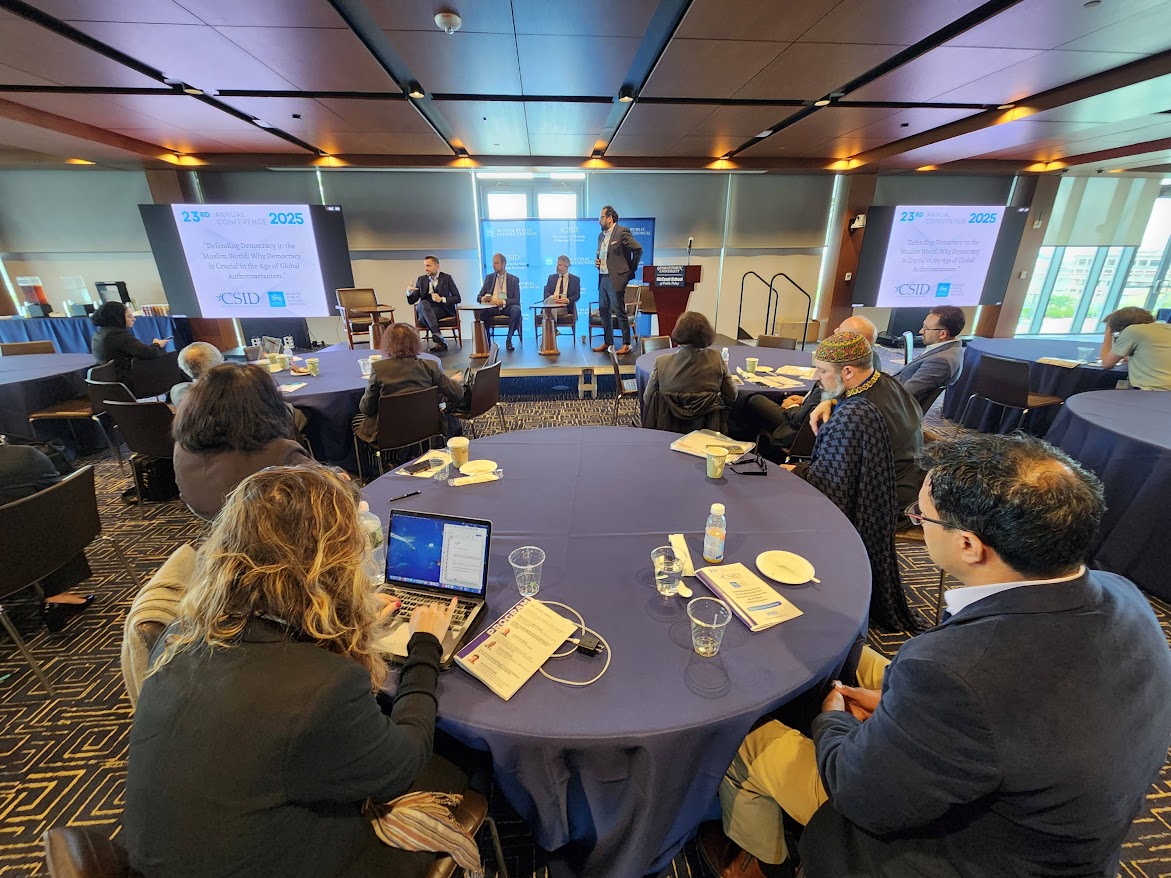
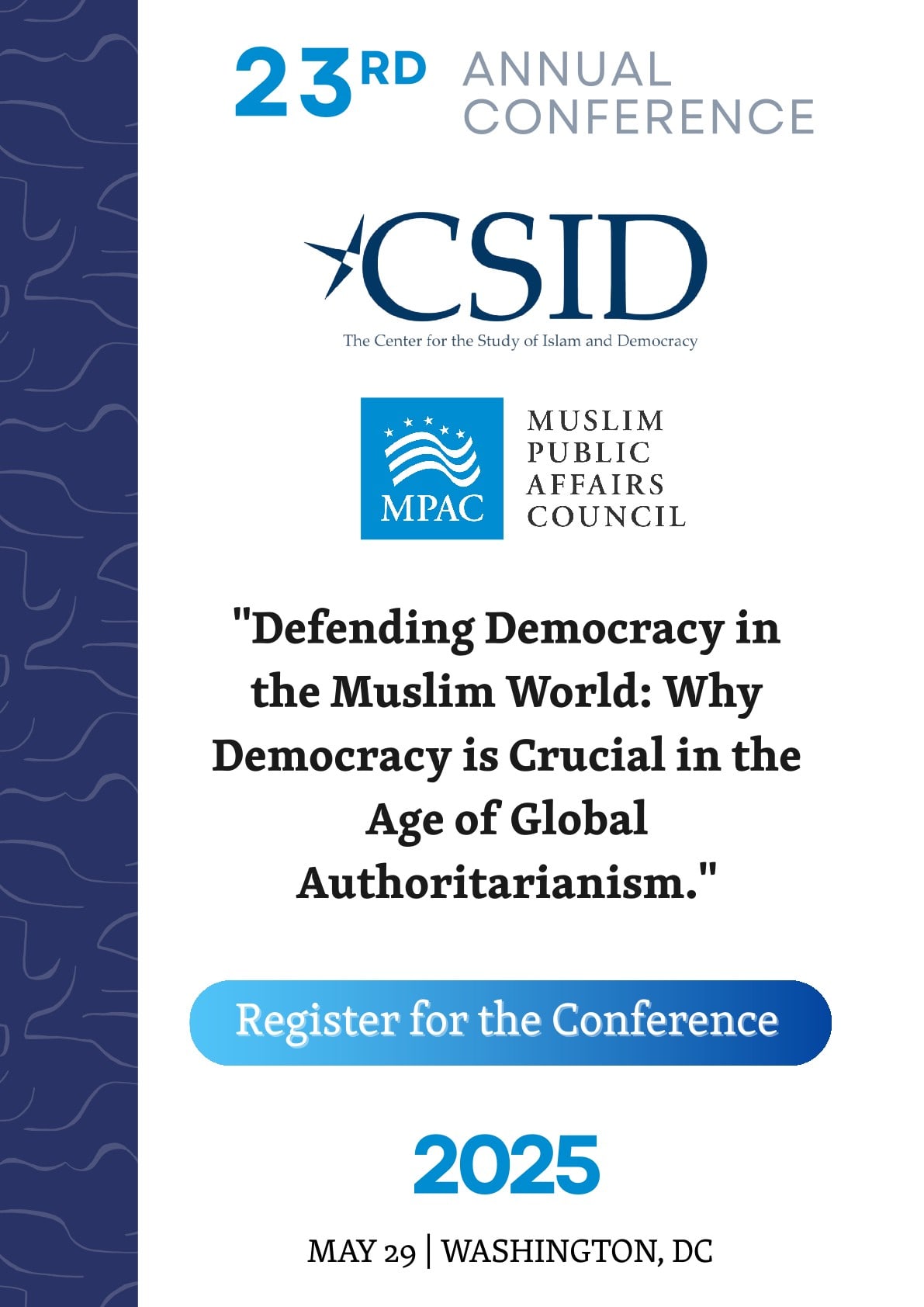
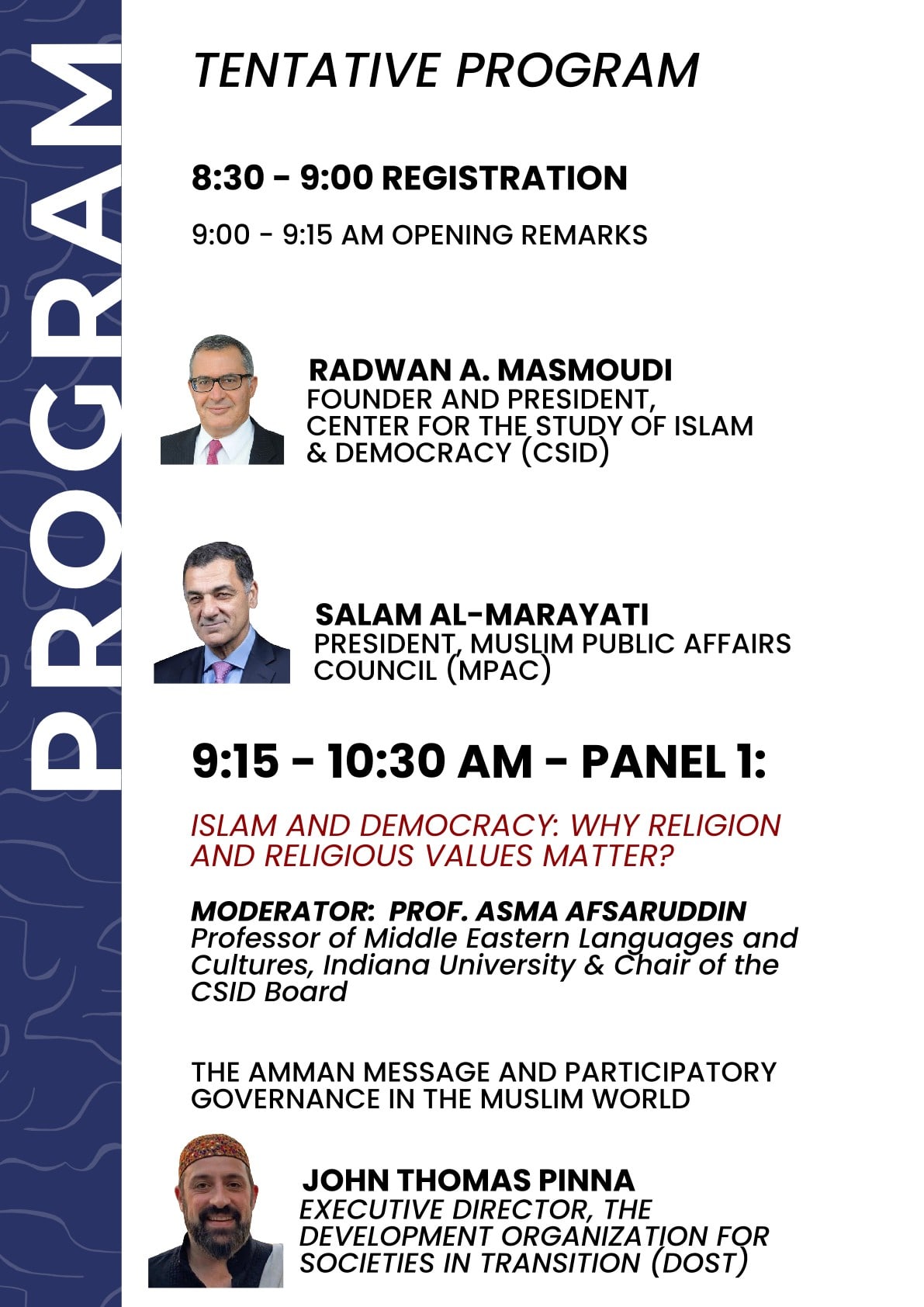
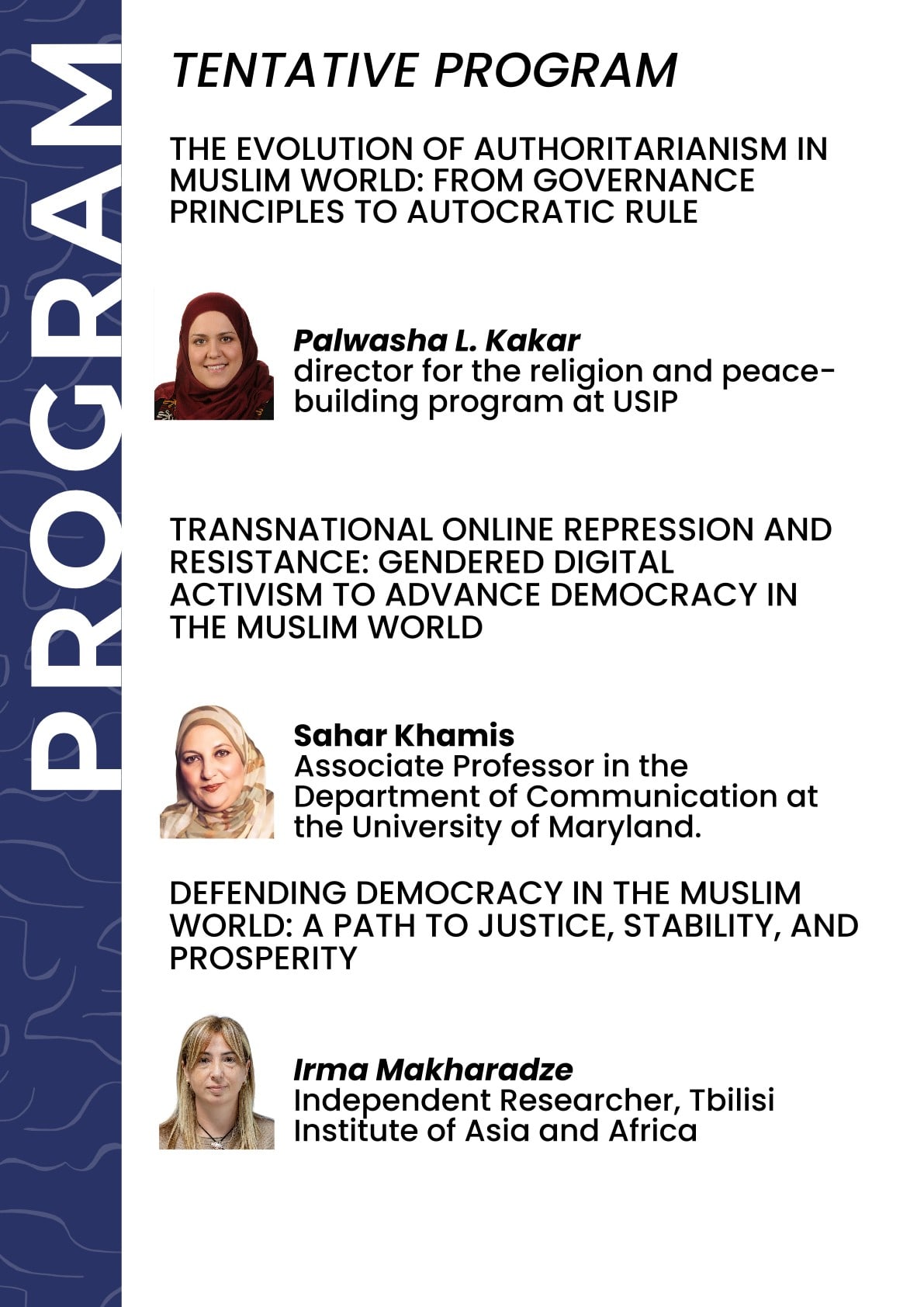


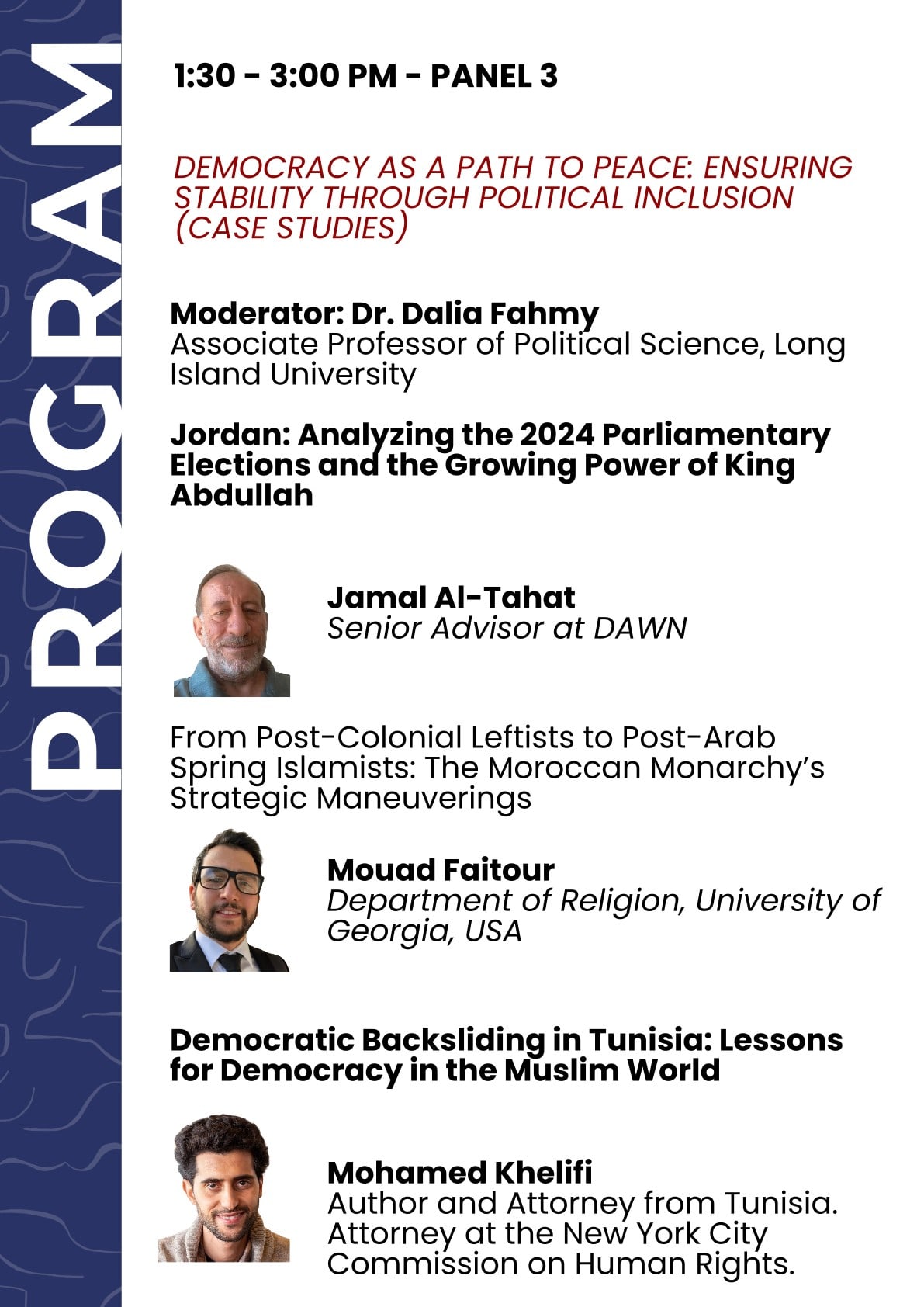
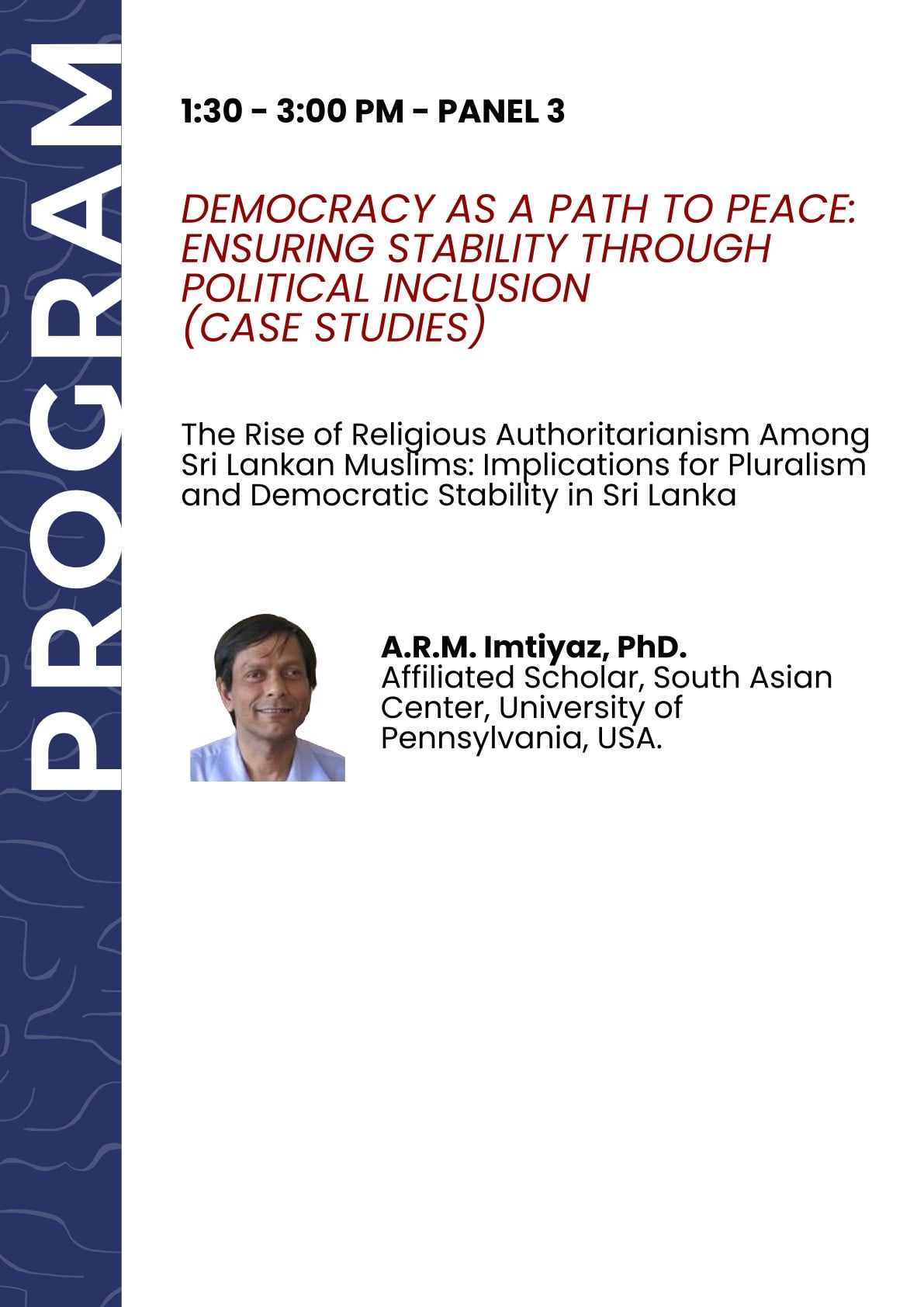
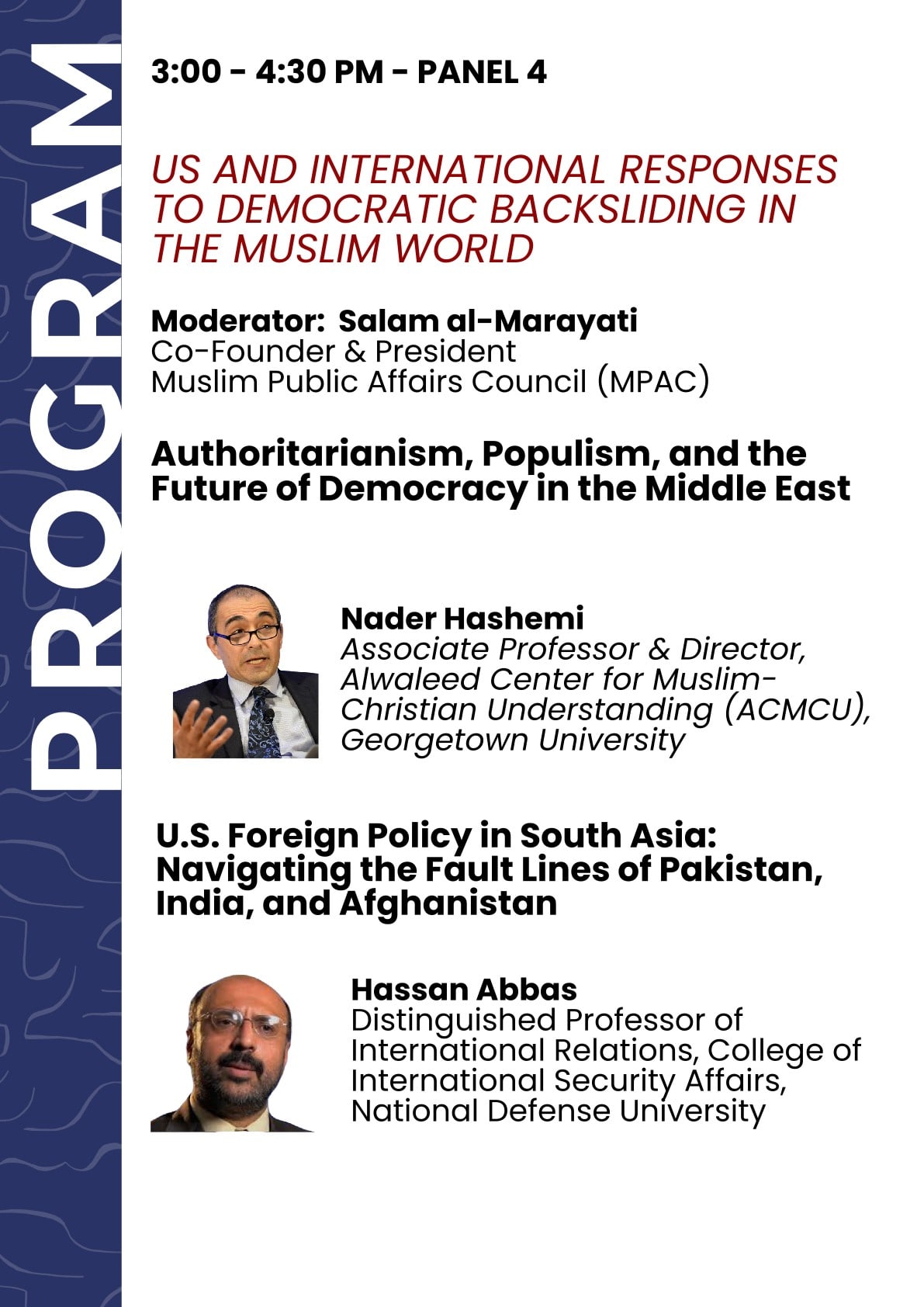
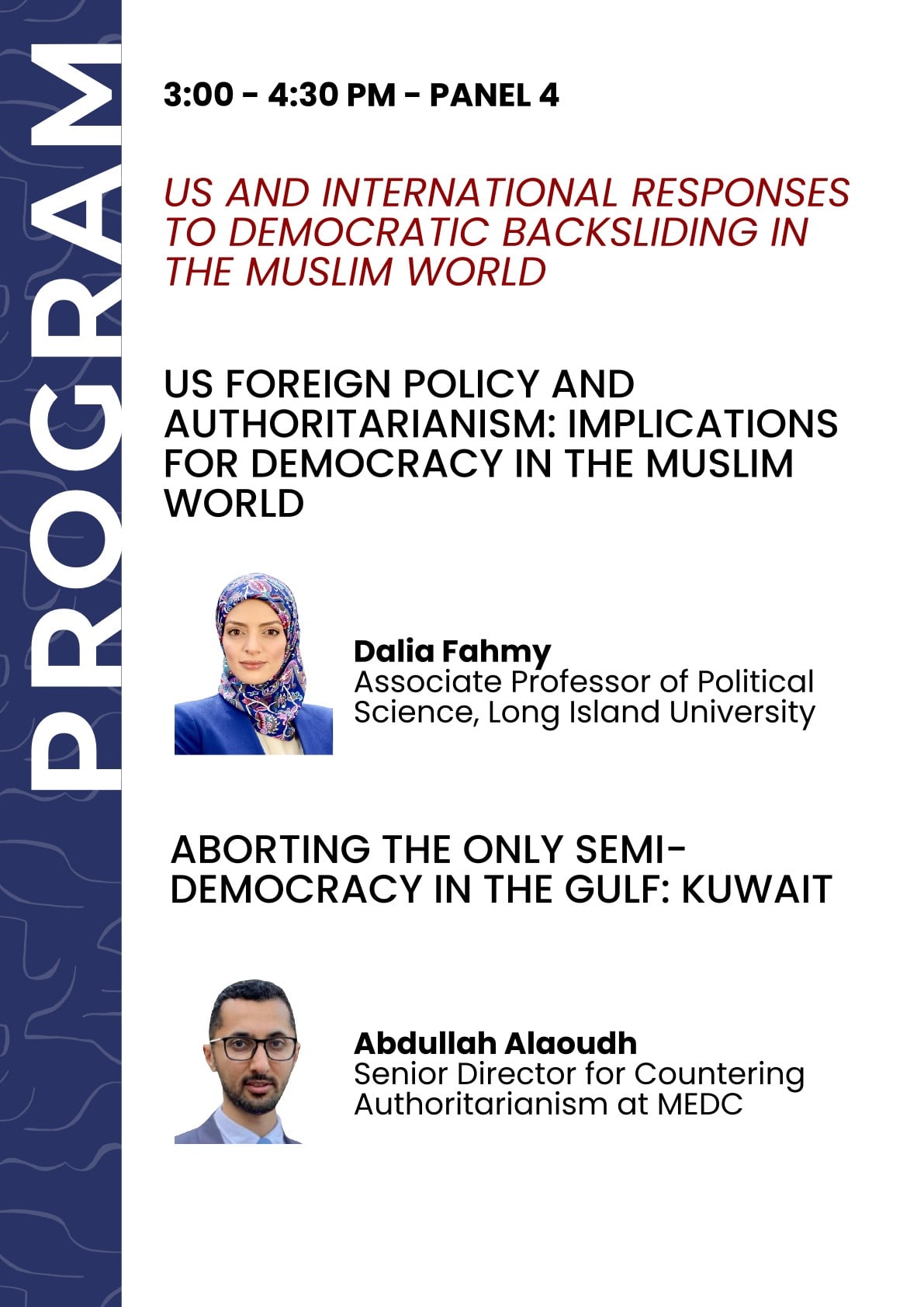
CSID-MPAC 23rd Annual Conference
Opening & Closing Remarks
Dr. Radwan Masmoudi
Salam al-Marayati
Panel 1: Democracy & Governance in the Muslim World
The Amman Message and Participatory Governance
John Thomas Pinna
The Evolution of Authoritarianism in the Muslim World
Palwasha L. Kakar & Mohammad O. Tariq
Transnational Online Repression & Gendered Digital Activism
Sahar Khamis
Defending Democracy in the Muslim World
Irma Makharadze
Q&A Session
Panel 2: Syria's Democratic Struggles
Panel Introduction
Haris Tarin
Prospects for Democracy Amid Conflict
Wa'el Alzayat
Mohammed Alaa Ghanem
Qutaiba Y. Idlbi
Q&A Session
LUNCHEON KEYNOTE SPEECH:
Sarah Leah Whitson
Sarah Leah Whitson (QA Session)
Panel 3: Authoritarianism & Democracy
A.R.M. Imtiyaz
Mohamed Khelifi
Jamal Al-Tahat
Mouad Faitour
Q&A Sessions
Panel 3
Panel 4: U.S. Foreign Policy & Authoritarianism
Abdullah Alaoudh, MEDC
Dalia Fahmy
Nader Hashemi
Hassan Abbas
Closing Keynote
Prof. Asma Afsaruddin – Chair, CSID Board
